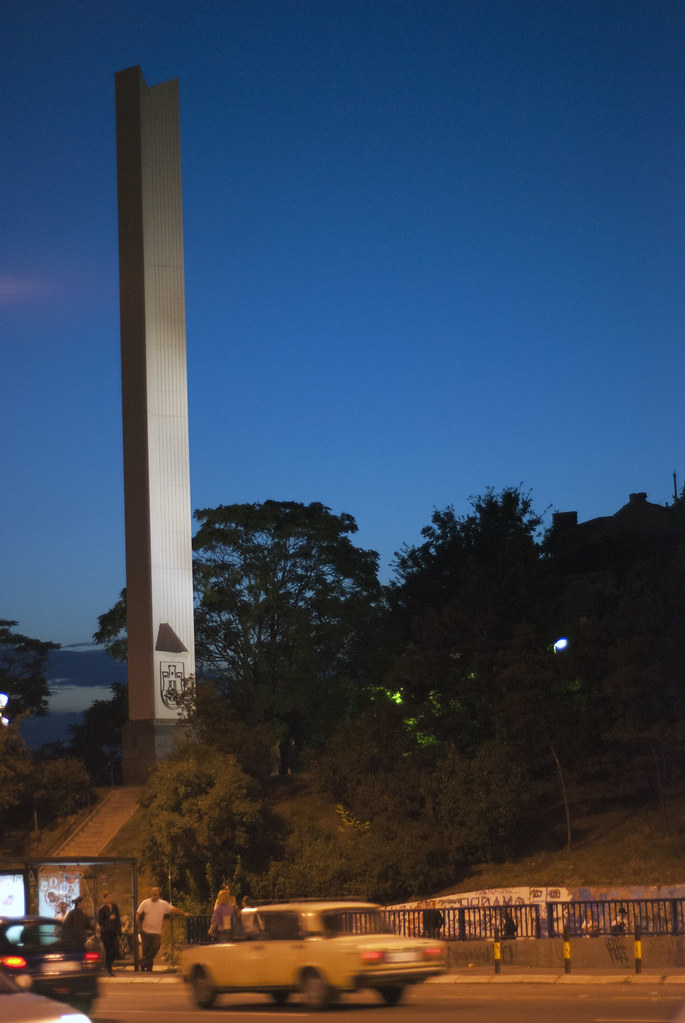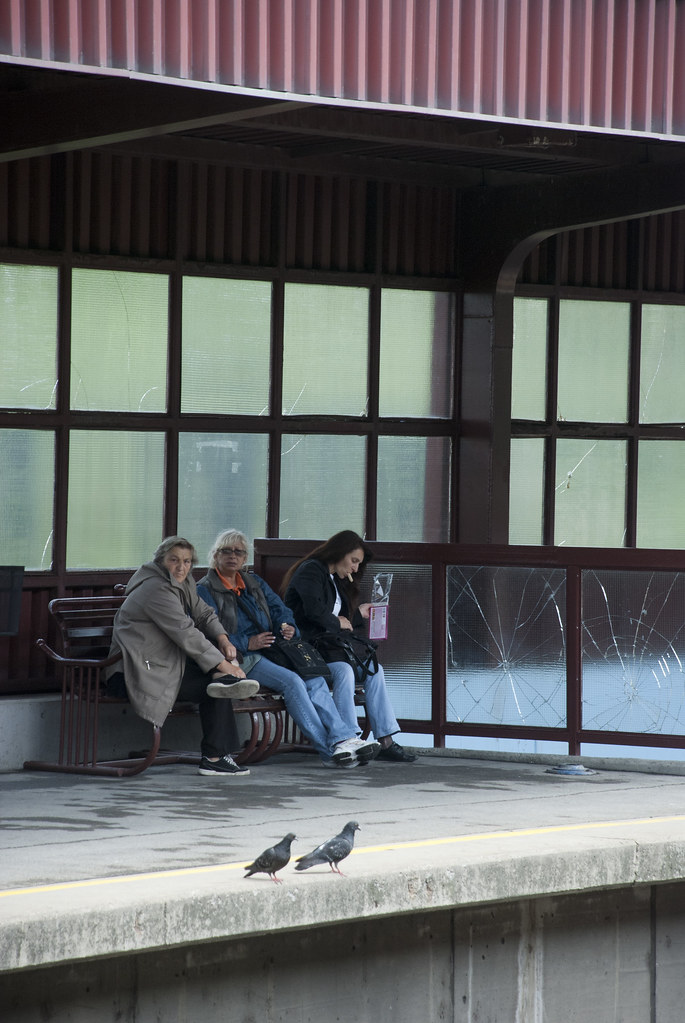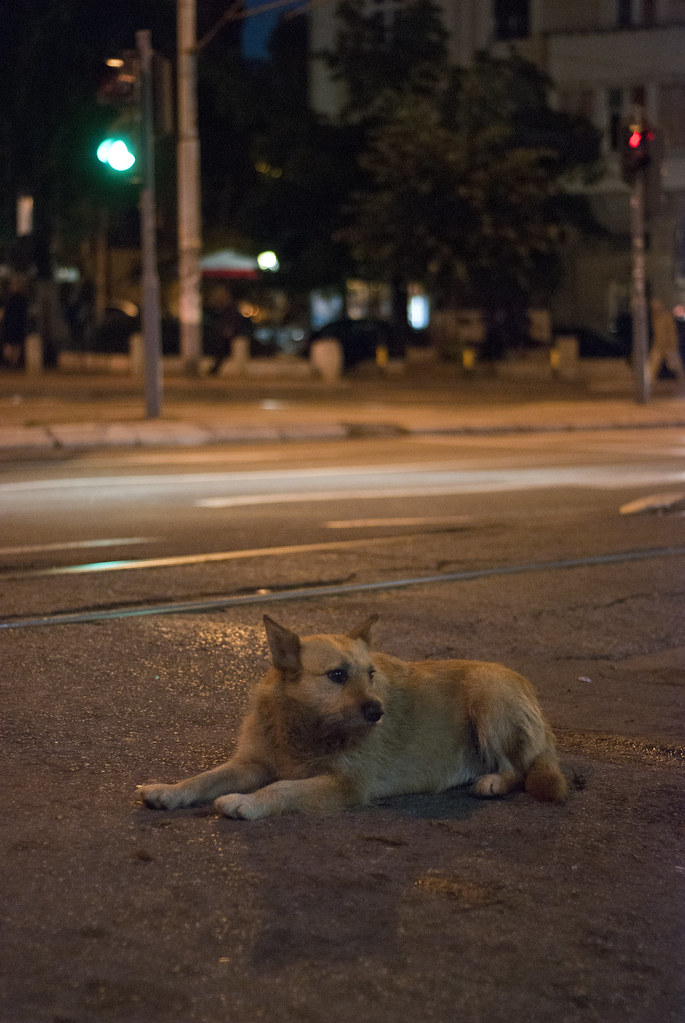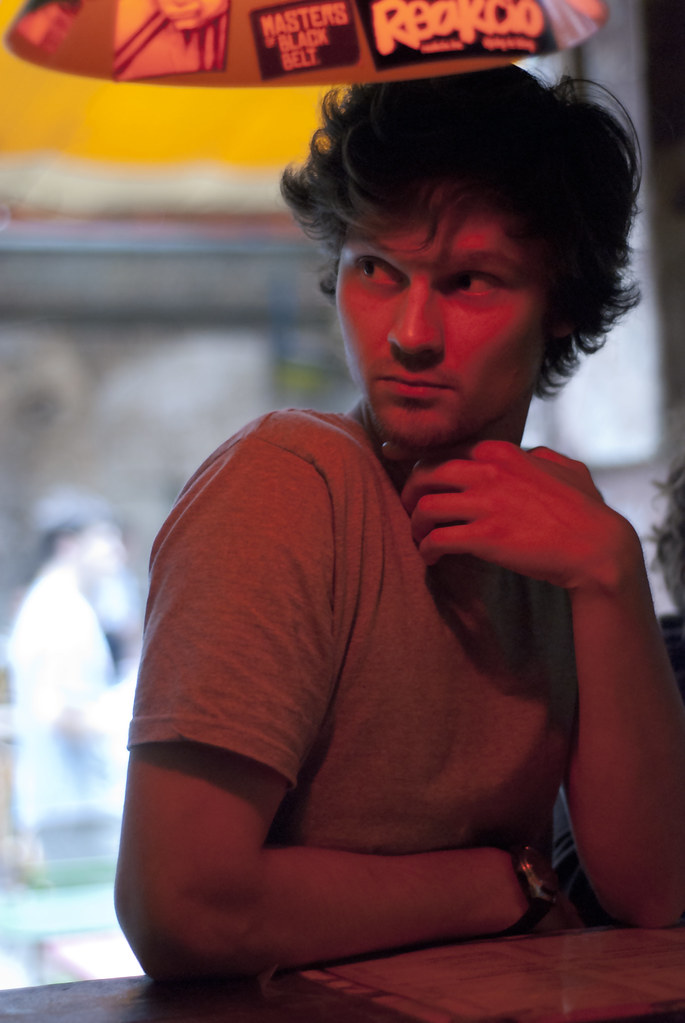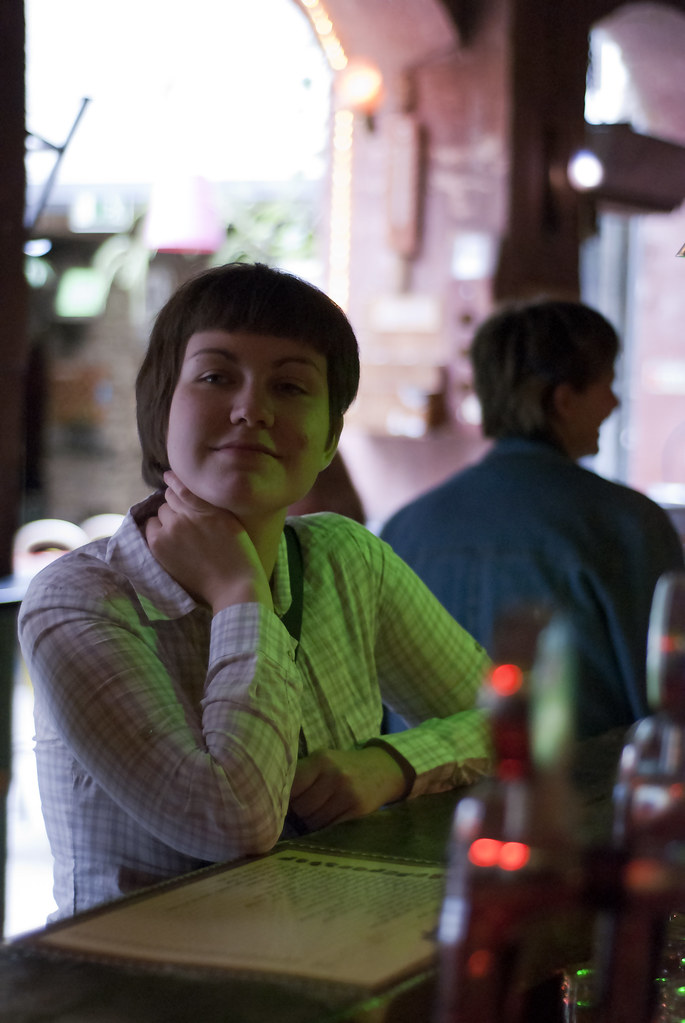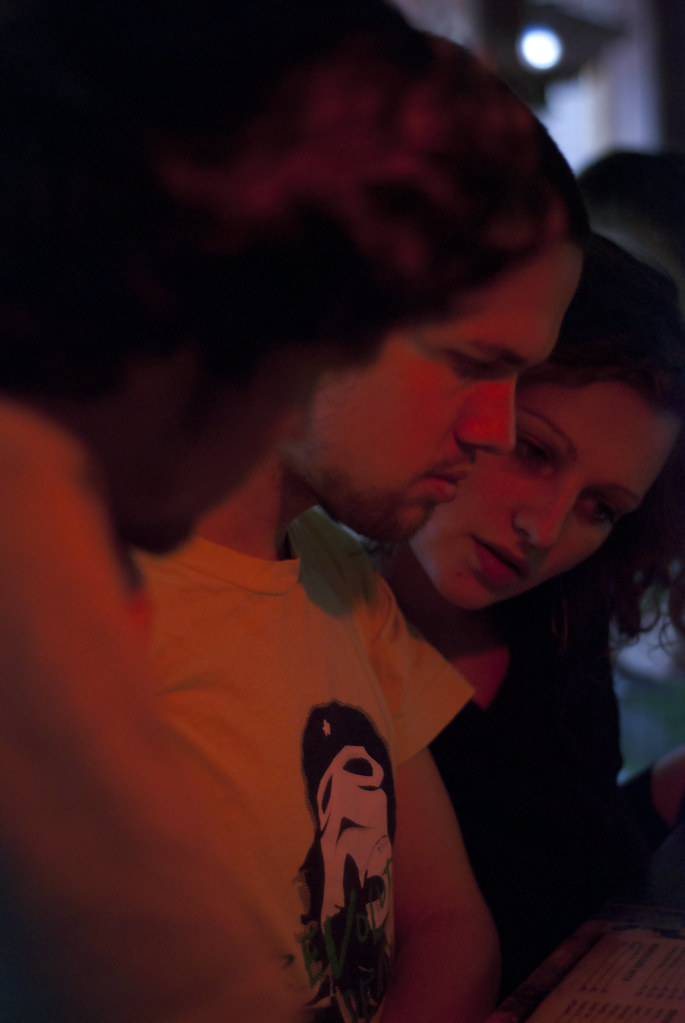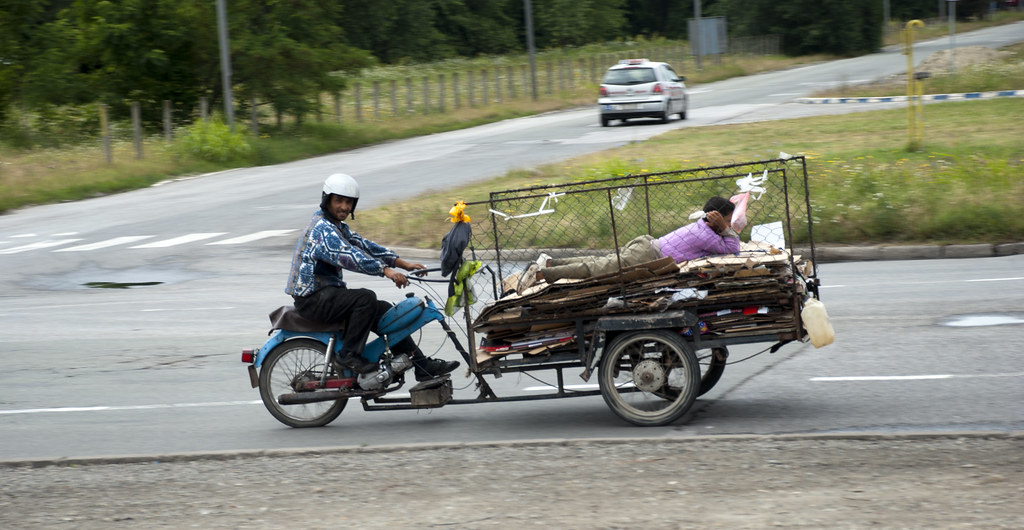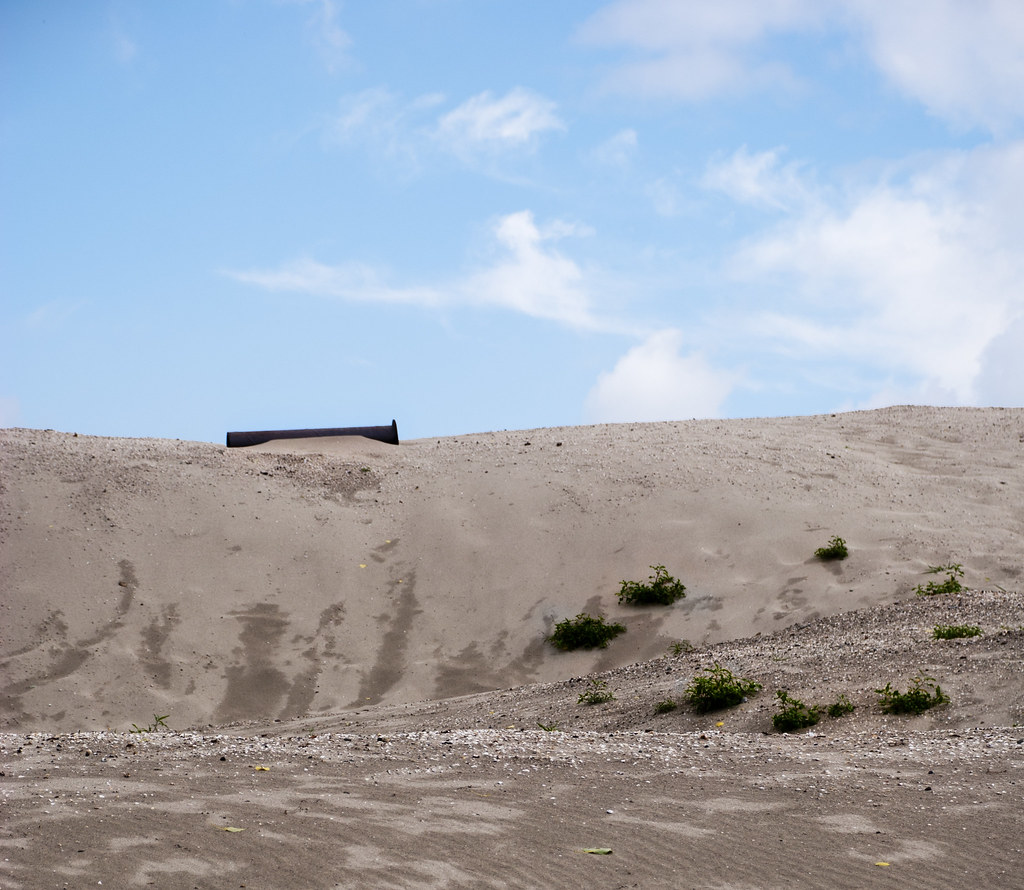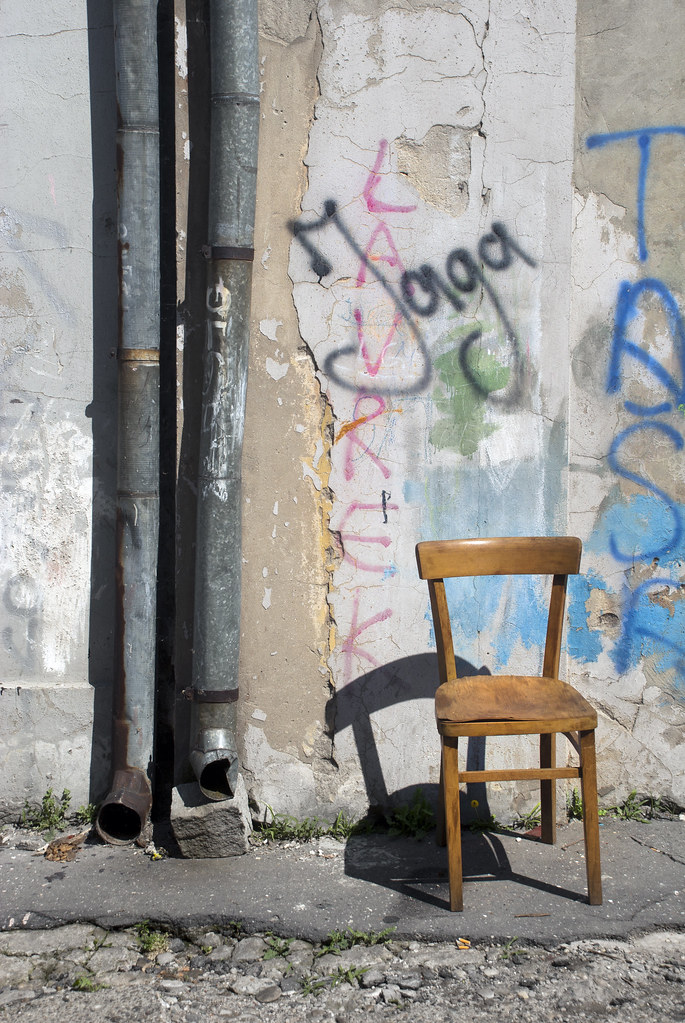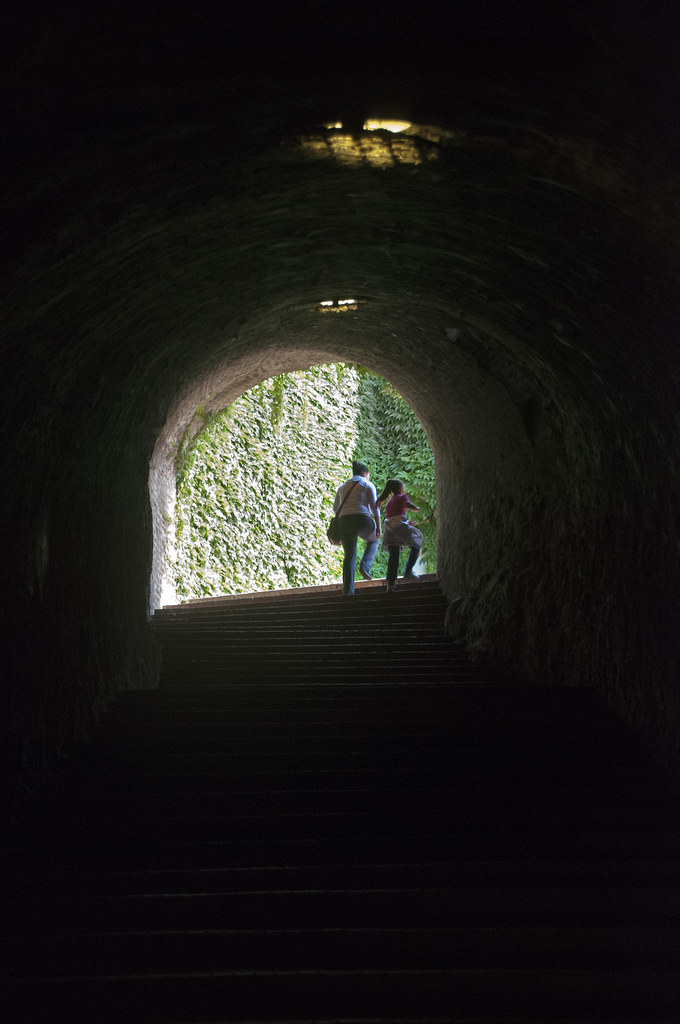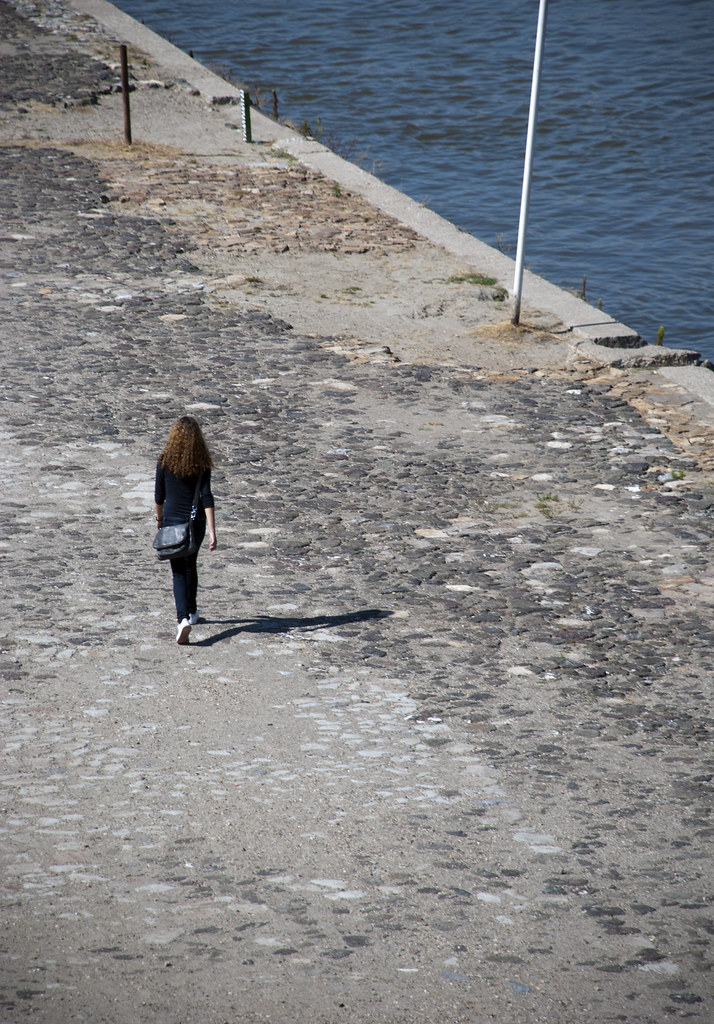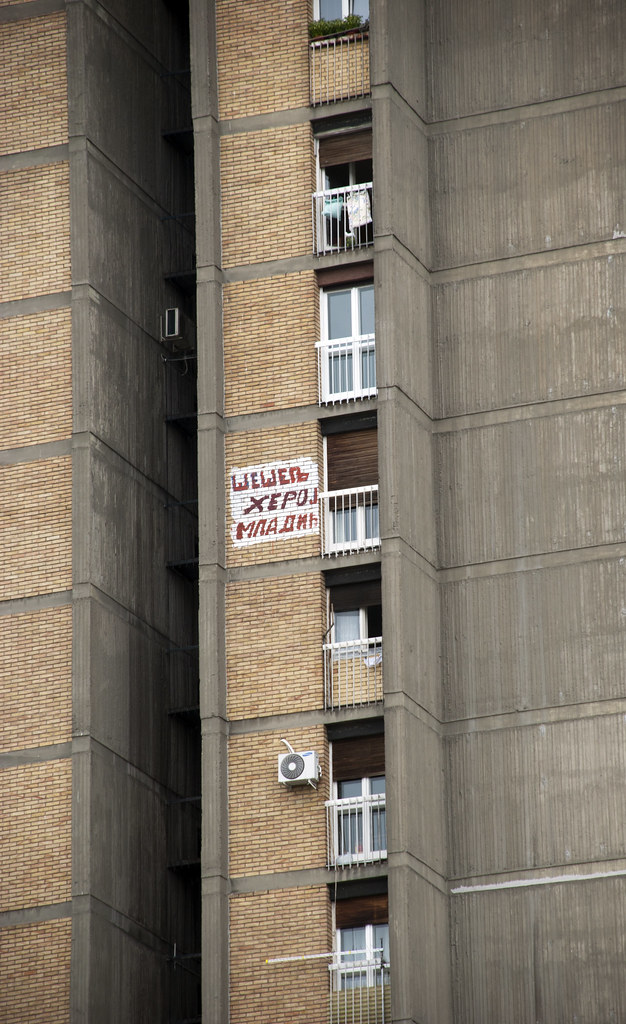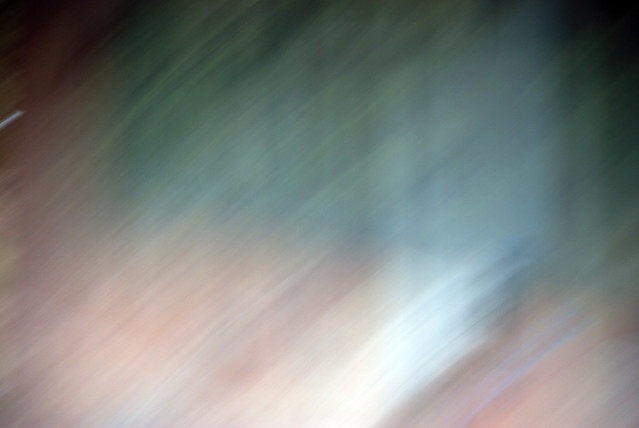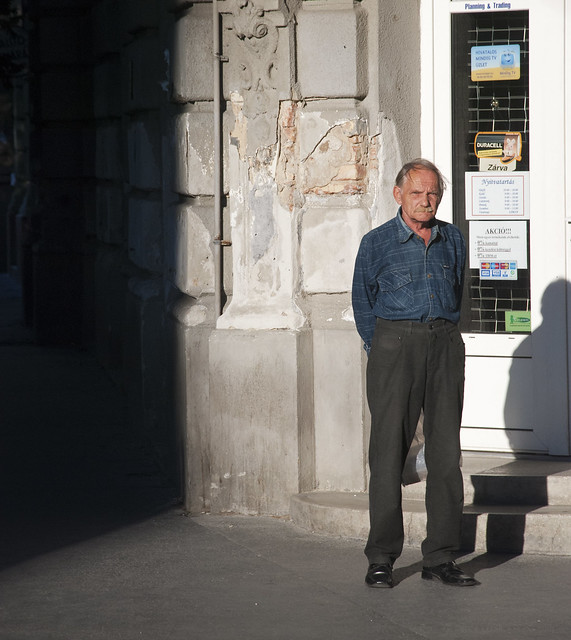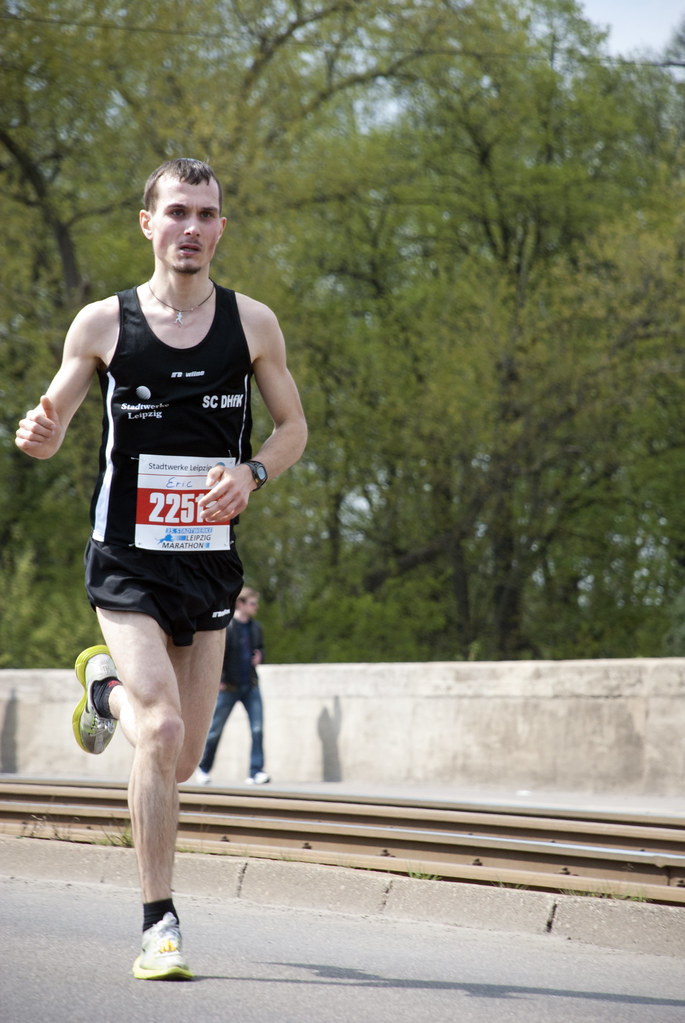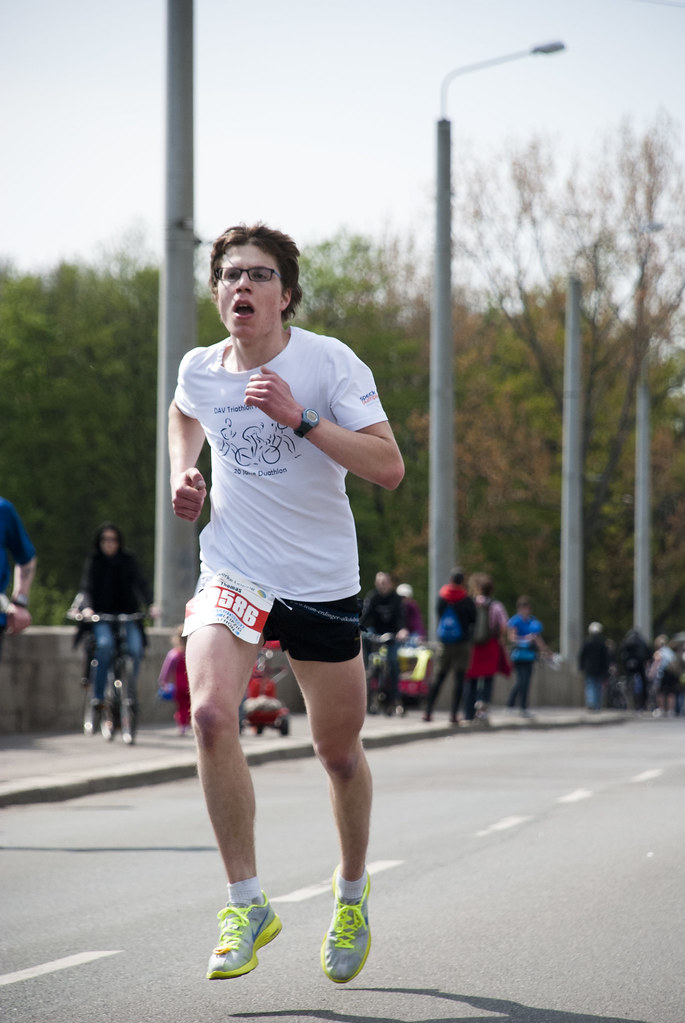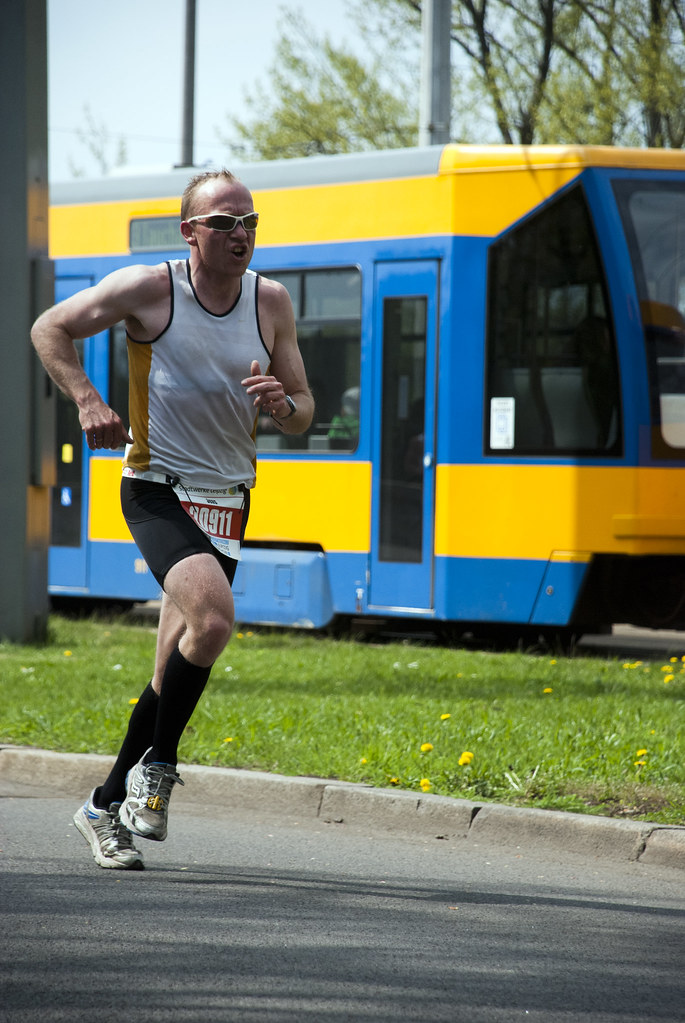This is the post in which I curtly repeat and emphasize my love for cinema and the movies and appraise this year's film companies' output to be pretty fucking good. And I haven't even yet seen "Drive" (January release in Germany), "The Ides Of March" (just released), "Hugo" (February), "Shame" (March), "The Help" (just released), "The Artist" (January), "Beginners" (missed it)...
That's why this list isn't close to being any kind of complete and subject to change, as are the ratings. It is, however, in order of preference. The rules: eligible for this list are all movies that were released in Germany this year, which in some cases is earlier than in other countries, and in most cases, later. Secondly, only full length feature films (meaning no short movies) are considered. Ratings for movies are always given on IMDb's 1-10 scale, where 1 is an utter and unbelievable abomination, 5 sub-average, 6 slightly above average, 7 good, 8 very good, 9 excellent and 10 a masterpiece.
1. Pina. After seeing this beautifully shot hommage to a great of performance, I finally understand what Pina Bausch meant when she said that dancing is a language. In every scene there's so much to decipher and translate from the moves, and a most beautiful rhythm to follow. Wim Wenders was right to choose 3D technology for this project: instead of drawing all attention to itself, it works to enhance the visual experience, especially in those shots on location in the town of Wuppertal, where Bausch founded her dancing theater group. 10/10
2. Jodaeiye Nader Az Simin (Nader & Simin, A Separation). This movie is speaking on a multitude of layers, resulting in a complex, yet not perplexing piece of cinematic art, so excellently brought from script into film that it's a pleasure to be able to enjoy it. Themes covered include social classes, religion, women's position in society, law and security, but instead of overwhelming the viewer with input, it does so with the depiction of a emotionally loaded situation. Because all of this seems, and probably is, very real, it's reminiscent of a documentary. The people are real, their lives are real, and the situation is for the viewer to resolve - or not, as sometimes there aren't solutions and judgement isn't easily placed. 10/10
3. Tyrannosaur. A sad old man, angry at the world and with himself, constantly lashing out against others, meets a woman who would be right to act as he does, but instead is in an endless spiral of receiving blows, deluding herself and forgiving. We witness two brilliant lead performances (as well as a downright intimidating supporting one) that make every aspect of the characters entirely convincing. Coupled with a setting so bleak that everyone's depression and being fed-up with their miserable lives is easily graspable and an excellent soundtrack, we have a winner on our hands. And win it should, in next year's award races. 9/10
4. Black Swan. "Intense" doesn't start to describe it. This tour de force will throw you into your cinema seat and leave you thoroughly upset and agitated. At the height of tension and trance, it ends and I'm still undecided whether that's brilliant, or whether Darren Aronofsky simply is an evil son of a bitch. Natalie Portman is the sole star here, and her amazing performance will make up for the film's few shortcomings, such as the relative flatness of all support characters - there's their monomania and little else. 9/10
5. Unter Schnee (Under Snow). Quite the experience, this film had a tremendous calming effect on me (and almost everyone else at the theater). The intense sound (amplified, but never artificial) and the beautiful pictures combine into an almost eerie sensation of serenity. A movie that you have to let go for. 9/10
Honourable mentions (no order in these ones): "The Guard" (8/10), "Submarine" (8/10), "Blue Valentine" (8/10), "Winter's Bone" (8/10), "Passione" ("Passion", 8/10), "Wer, Wenn Nicht Wir" ("If Not Us, Who?", 9/10), "Another Year" (9/10), and "Was Du Nicht Siehst" ("What You Don't See", 8/10).
Biggest letdowns (movies I went into expecting much and went out severely disappointed): "Loong Boonmee Raleuk Chat" ("Uncle Boonmee Who Can Recount His Past Lives", 4/10) and "Les Amour Imaginaires" ("Heartbeats", 4/10).
Samstag, 31. Dezember 2011
Freitag, 30. Dezember 2011
Best of 2011 - The music.
The songs (in no particular order, and ignoring last year's restriction to five tracks)...
Austra - Beat And The Pulse (official video)
*Technically, the single was released in 2010 already, but the album came out this year.
Bill Wells & Aidan Moffat - The Copper Top (official video)
The Antlers - No Widows (live video)
When Saints Go Machine - Kelly (absolutely positively awesome live video, official video version here)
Peter & Kerry - Knees (official video)
Trust - Candy Walls (official video)
J Mascis - Listen To Me (no video)
Very notable mentions:
Alex Ebert feat. RZA - Truth (everyone loves the Ebert song, but the version with RZA is even better).
The Antlers - Putting The Dog To Sleep.
Zola Jesus - Vessel.
Fotoshop - Too little, too late.
John Maus - Believer.
Austra - Darken Her Horse.
...and the shows:
06.04. Belle & Sebastian - Columbiahalle (Berlin).
- and that is that. Unlike last year, there simply weren't enough concerts amazing enough to list here. This is partly due to the fact that I didn't see as many shows in the past months, but there were also enough that should have made this list, but didn't quite live up to my expectations: Austra and Lykke Li come to mind immediately. Some were fine, but not exceptional: We're talking Zola Jesus, iLiKETRAiNS & When Saints Go Machine here. On the other hand, the single concert that stood out this year, Belle & Sebastian's, also stands out as one of best I have attended my entire life. There's nothing quite like one of your most favourite bands ending their show with the very first song of theirs you loved ("Judy & The Dream Of Horses", if you care to know).
Austra - Beat And The Pulse (official video)
*Technically, the single was released in 2010 already, but the album came out this year.
Bill Wells & Aidan Moffat - The Copper Top (official video)
The Antlers - No Widows (live video)
When Saints Go Machine - Kelly (absolutely positively awesome live video, official video version here)
Peter & Kerry - Knees (official video)
Trust - Candy Walls (official video)
J Mascis - Listen To Me (no video)
Very notable mentions:
Alex Ebert feat. RZA - Truth (everyone loves the Ebert song, but the version with RZA is even better).
The Antlers - Putting The Dog To Sleep.
Zola Jesus - Vessel.
Fotoshop - Too little, too late.
John Maus - Believer.
Austra - Darken Her Horse.
...and the shows:
06.04. Belle & Sebastian - Columbiahalle (Berlin).
- and that is that. Unlike last year, there simply weren't enough concerts amazing enough to list here. This is partly due to the fact that I didn't see as many shows in the past months, but there were also enough that should have made this list, but didn't quite live up to my expectations: Austra and Lykke Li come to mind immediately. Some were fine, but not exceptional: We're talking Zola Jesus, iLiKETRAiNS & When Saints Go Machine here. On the other hand, the single concert that stood out this year, Belle & Sebastian's, also stands out as one of best I have attended my entire life. There's nothing quite like one of your most favourite bands ending their show with the very first song of theirs you loved ("Judy & The Dream Of Horses", if you care to know).
Zettelkasten:
note to self
Donnerstag, 29. Dezember 2011
A month of movies: December.
The short -
Go and see: /
Well worth watching: Submarine.
Also deserving a chance: Halt Auf Freier Strecke (Stopped On Track).
Average: Melancholia.
If you're into Germans, or alcoholism, or German alcoholics: Portraits Deutscher Alkoholiker.
Forget about: Hanna (DVD).
The long -
Zettelkasten:
kinoticket
Mittwoch, 30. November 2011
A month of movies: November.
This is the month where being angry at Duncan Jones (who debuted with the excellent "Moon" just two years ago) for his sorry excuse of a science-fiction movie "Source Code" (trailer, if you must) is by far outweighed by the appearance of another exciting new director: Paddy Considine. His "Tyrannosaur" (trailer) is among the best films I have seen this year. That, however, is not even my personal favourite of the month, as I finally had the chance to see the Greek production "Kynodontas" (trailer), runner-up in last year's Best Foreign Oscar race. It's unsettling, to say the very least, in every single minute of its span. I urge you to not miss out. Further recommendations: "The Guard" (trailer), an Irish comedy by the brother of the head behind (and featuring the same lead as) everyone's darling "In Bruges"; and "Putty Hill" (trailer), an intelligent and low-key pseudo-documentary. It's been a good four and a half weeks, kids.
The short -
Go and see: Kynodontas (Dogtooth) (DVD), Tyrannosaur.
Well worth watching: The Guard.
Also deserving a chance: Le Nom De Gens (The Names Of Love) (DVD), Putty Hill, Hævnen (In A Better World) (DVD).
Average: Hors-La-Loi (Outside The Law) (DVD).
If you're into CGI disguised as sci-fi: Source Code (DVD).
Forget about: Red (DVD).
The long -
The short -
Go and see: Kynodontas (Dogtooth) (DVD), Tyrannosaur.
Well worth watching: The Guard.
Also deserving a chance: Le Nom De Gens (The Names Of Love) (DVD), Putty Hill, Hævnen (In A Better World) (DVD).
Average: Hors-La-Loi (Outside The Law) (DVD).
If you're into CGI disguised as sci-fi: Source Code (DVD).
Forget about: Red (DVD).
The long -
Zettelkasten:
kinoticket
Dienstag, 29. November 2011
Buchbesprechung: Vladimir Pištalo "Millennium in Belgrad".
Vladimir Pištalo zeichnet im Prolog zu seinem Roman „Millennium in Belgrad“ die immer wieder in die Stadt zurückkehrende Zerstörung als einen Fluch der Götter, als Strafe für den Menschen, der sich von ihrer großen Kreation abgewendet hat. Statt eine Stütze für ihren Bewohner soll sie auf ewig eine offene Wunde sein.
Erzählt wird die Geschichte von fünf Jugendlichen, die 1980 der Beerdigung Titos indifferent per Fernseher beiwohnen, und ihres Erwachsenwerdens und ihrer Zerrüttung in den folgenden zwei Jahrzehnten – analog zum Niedergang Jugoslawiens und vor allem seiner Hauptstadt, aus der heraus Gewalt gesät wird, um Zerstörung in sie zu bringen. Milan, der Erzähler, Zora, Bane, Boris und Irina sind Teil der Generation nach Tito, desillusioniert von der Inszenierung einer schon vor ihrem Führer gestorbenen Ideologie und zukunftslos in einer im Zerfall befindlichen Gesellschaft. „Ich habe etwas zu sagen, aber ich weiß nicht wie“, beschreibt Bane nicht nur seine musikalischen Perspektiven. Der Sturz in den New Wave, in Liebe, Bier und Sex ist nicht Ausdruck eines letztes Aufbäumens, sondern einer Flucht ins Unpolitische, einer extremen Form des Wartens auf den großen Knall.
Genauso kaputt wie der Staat und die meisten seiner Menschen sind auch ihre Familien. Gegenüber dem Gebrüll des „aggressiven Faschisten im Wohnzimmer“, dem Fernseher, von dem sie entweder betäubt oder angestachelt werden, resignieren sie in ihrer schrumpfenden Existenz oder stimmen triumphierend ein. Als sich 1991 endlich die Spannung entlädt und der Krieg in Slowenien und Kroatien ausbricht, wird Bane zum Militärdienst eingezogen. Er, der als einziger der Gruppe in die Emigration hätte flüchten können, fügt sich der ihm zugewiesenen Rolle und zerbricht, als sich in Vukovar Menschen, die zehn Jahre zuvor gemeinsam um Tito trauerten, zum Sound des New Wave gegenseitig umbringen. Er verlässt das Land, das mit sich selbst darum kämpft, Länder zu sein.
Zora zieht sich immer vehementer in eine idealisierte Traumwelt zurück, ihre Beziehung zu Boris geht an dessen entgegengesetzter Entwicklung, hin zum Gläubiger des nationalen Wahnsinns, zugrunde. Auch Milan und Irina entfremden sich, er betrachtet den sie alle längst nicht mehr nur umgebenden Zerfall immer hilfloser, während sie zurück zum Heroin flüchtet. Der Erzähler bilanziert treffend: „Ich habe schon gesagt, dass das eine Geschichte vom ständigen Wegbrechen der Stützen ist“. Boris geht nach Bosnien, kehrt als versehrter Kriegsgewinnler zurück und macht Karriere in der Belgrader Unterwelt. Hier scheint es, als drohe Pištalo den Bogen zu überspannen und die fünf Personen auf Archetypen ihrer Generation zu reduzieren. Wieviel hatte der Freundeskreis zuvor gemeinsam, als dass sich dessen Mitglieder so weit voneinander entfernen würden? Doch genau da schließt die Analogie zum Land: Wieviel hatten die Menschen Jugoslawiens zuvor gemeinsam, als dass sie sich einmal in solcher Unbarmherzigkeit gegenüberstehen würden?
Beraubt aller Stützen, wird am Ende des Romans die Wunde Belgrad erneut aufgerissen. Der Krieg kehrt nach Hause zurück und Milan hadert mit dem Schicksal der Stadt, das auch seines ist. Doch bricht kurz darauf ein neues Millennium an und mit ihm die Chance, den Mensch mit den rachsüchtigen Göttern zu versöhnen.
Das Buch ist, übersetzt von Brigitte Döbert, im März 2011 in der Edition Balkan des Dittrich Verlags erschienen. Die Veröffentlichung des Originals „Milenijum u Beogradu“ liegt bereits zwei Jahre zurück. Sein Autor Vladimir Pištalo wurde 1960 in Sarajevo geboren und wuchs in Mostar, Kraljevo und Belgrad auf. Für seinen Roman „Tesla, portret među maskama“ („Tesla, ein Porträt zwischen den Masken“, bisher nicht ins Deutsche übersetzt) erhielt er 2008 den NIN-Preis. Heute lebt er in Worcester (Massachusetts, USA) und Belgrad.
Erzählt wird die Geschichte von fünf Jugendlichen, die 1980 der Beerdigung Titos indifferent per Fernseher beiwohnen, und ihres Erwachsenwerdens und ihrer Zerrüttung in den folgenden zwei Jahrzehnten – analog zum Niedergang Jugoslawiens und vor allem seiner Hauptstadt, aus der heraus Gewalt gesät wird, um Zerstörung in sie zu bringen. Milan, der Erzähler, Zora, Bane, Boris und Irina sind Teil der Generation nach Tito, desillusioniert von der Inszenierung einer schon vor ihrem Führer gestorbenen Ideologie und zukunftslos in einer im Zerfall befindlichen Gesellschaft. „Ich habe etwas zu sagen, aber ich weiß nicht wie“, beschreibt Bane nicht nur seine musikalischen Perspektiven. Der Sturz in den New Wave, in Liebe, Bier und Sex ist nicht Ausdruck eines letztes Aufbäumens, sondern einer Flucht ins Unpolitische, einer extremen Form des Wartens auf den großen Knall.
Genauso kaputt wie der Staat und die meisten seiner Menschen sind auch ihre Familien. Gegenüber dem Gebrüll des „aggressiven Faschisten im Wohnzimmer“, dem Fernseher, von dem sie entweder betäubt oder angestachelt werden, resignieren sie in ihrer schrumpfenden Existenz oder stimmen triumphierend ein. Als sich 1991 endlich die Spannung entlädt und der Krieg in Slowenien und Kroatien ausbricht, wird Bane zum Militärdienst eingezogen. Er, der als einziger der Gruppe in die Emigration hätte flüchten können, fügt sich der ihm zugewiesenen Rolle und zerbricht, als sich in Vukovar Menschen, die zehn Jahre zuvor gemeinsam um Tito trauerten, zum Sound des New Wave gegenseitig umbringen. Er verlässt das Land, das mit sich selbst darum kämpft, Länder zu sein.
Zora zieht sich immer vehementer in eine idealisierte Traumwelt zurück, ihre Beziehung zu Boris geht an dessen entgegengesetzter Entwicklung, hin zum Gläubiger des nationalen Wahnsinns, zugrunde. Auch Milan und Irina entfremden sich, er betrachtet den sie alle längst nicht mehr nur umgebenden Zerfall immer hilfloser, während sie zurück zum Heroin flüchtet. Der Erzähler bilanziert treffend: „Ich habe schon gesagt, dass das eine Geschichte vom ständigen Wegbrechen der Stützen ist“. Boris geht nach Bosnien, kehrt als versehrter Kriegsgewinnler zurück und macht Karriere in der Belgrader Unterwelt. Hier scheint es, als drohe Pištalo den Bogen zu überspannen und die fünf Personen auf Archetypen ihrer Generation zu reduzieren. Wieviel hatte der Freundeskreis zuvor gemeinsam, als dass sich dessen Mitglieder so weit voneinander entfernen würden? Doch genau da schließt die Analogie zum Land: Wieviel hatten die Menschen Jugoslawiens zuvor gemeinsam, als dass sie sich einmal in solcher Unbarmherzigkeit gegenüberstehen würden?
Beraubt aller Stützen, wird am Ende des Romans die Wunde Belgrad erneut aufgerissen. Der Krieg kehrt nach Hause zurück und Milan hadert mit dem Schicksal der Stadt, das auch seines ist. Doch bricht kurz darauf ein neues Millennium an und mit ihm die Chance, den Mensch mit den rachsüchtigen Göttern zu versöhnen.
Das Buch ist, übersetzt von Brigitte Döbert, im März 2011 in der Edition Balkan des Dittrich Verlags erschienen. Die Veröffentlichung des Originals „Milenijum u Beogradu“ liegt bereits zwei Jahre zurück. Sein Autor Vladimir Pištalo wurde 1960 in Sarajevo geboren und wuchs in Mostar, Kraljevo und Belgrad auf. Für seinen Roman „Tesla, portret među maskama“ („Tesla, ein Porträt zwischen den Masken“, bisher nicht ins Deutsche übersetzt) erhielt er 2008 den NIN-Preis. Heute lebt er in Worcester (Massachusetts, USA) und Belgrad.
Zettelkasten:
lesezeichen
Montag, 7. November 2011
War is hell, Mr. Thornhill, even if it's a cold one.
"Honest women frighten me." - "Why?" - "Somehow they seem to put me at a disadvantage." - "Because you're not honest with them?" - "Exactly." (Roger O. Thornhill & Eve Kendall)
"Men like you..." - "What's wrong with men like me?" - "They don't believe in marriage." - "Oh, I've been married twice." (Eve Kendall & Roger O. Thornhill)
"I've got a job, a secretary, a mother, two ex-wives and several bartenders dependent upon me... and I don't intend to disappoint them by getting killed." (Roger O. Thornhill)
"I'm a big girl." - "Yeah, and in all the right places too." (Eve Kendall & Roger O. Thornhill)
"I've never trusted neatness. Neatness is always the result of deliberate planning." (Leonard)
(Screenshot und Zitate aus North By Northwest.)
Zettelkasten:
kinoticket,
notizblock
Sonntag, 30. Oktober 2011
A month of movies: October.
Due to work and more work and lack of sleep and everything else I haven't really been able to go to the movies the past month, or to update this blog for that matter. The way things look this won't change in the next four weeks either, but fret not: Sometimes around the end of the year, things should get livelier again. Until then, watch "Blue Valentine" (trailer) if you haven't already and have a fine Sunday evening!
The short -
Go and see: /
Well worth watching: Blue Valentine.
Also deserving a chance: /
Average: Nowhere Boy (DVD).
If you're into Scandinavian films: En Familie (A Family) (DVD).
Forget about: TRON: Legacy (DVD).
The long -
The short -
Go and see: /
Well worth watching: Blue Valentine.
Also deserving a chance: /
Average: Nowhere Boy (DVD).
If you're into Scandinavian films: En Familie (A Family) (DVD).
Forget about: TRON: Legacy (DVD).
The long -
Zettelkasten:
kinoticket
Dienstag, 11. Oktober 2011
Samstag, 8. Oktober 2011
Dienstag, 4. Oktober 2011
A month of movies: September.
Please remind me not to get excited about the cinema culture of a whole country because a single movie has made a deep and long-lasting impact. This month saw the fifth installment of the Argentinische Filmtage (Festival of Argentine Film) in Leipzig, and the three movies (as well as a block of short films not discussed here) that I got around to see left me largely unimpressed. It is well, especially considering this month's share of awful DVD viewings, that this was balanced by two remarkable productions: "Unter Schnee" (trailer) by Ulrike Ottinger and the Russian "Kak Ya Provel Etim Letom" (trailer). Both have seen (and should continue to see) some screenings at festivals around the globe.
The short -
Go and see: Unter Schnee (Under Snow).
Well worth watching: Kak Ya Provel Etim Letom (How I Ended This Summer) & Toy Story 3 (DVD).
Also deserving a chance: Gainsbourg (Vie Héroïque) (Gainsbourg) (DVD) & Kick-Ass (DVD).
Average: Revolución: El Cruce De Los Andes & Im Winter Ein Jahr (Aftermath) (DVD).
If you really care about Argentine cinema: Adopción (Adoption) & La Vieja De Atrás.
Forget about: Giulia Non Esce La Sera (Giulia Doesn't Date At Night), The Expendables (DVD) & Resident Evil: Afterlife (DVD).
The long -
The short -
Go and see: Unter Schnee (Under Snow).
Well worth watching: Kak Ya Provel Etim Letom (How I Ended This Summer) & Toy Story 3 (DVD).
Also deserving a chance: Gainsbourg (Vie Héroïque) (Gainsbourg) (DVD) & Kick-Ass (DVD).
Average: Revolución: El Cruce De Los Andes & Im Winter Ein Jahr (Aftermath) (DVD).
If you really care about Argentine cinema: Adopción (Adoption) & La Vieja De Atrás.
Forget about: Giulia Non Esce La Sera (Giulia Doesn't Date At Night), The Expendables (DVD) & Resident Evil: Afterlife (DVD).
The long -
Zettelkasten:
kinoticket
Freitag, 23. September 2011
Montag, 19. September 2011
Short Cut #6: "An Occurence At Owl Creek Bridge".
Weil es mal wieder Zeit für Kurzfilme ist: Der Klassiker "An Occurence At Owl Creek Bridge" (sic!, "La Rivière Du Hibou", 24:58 Minuten) von Robert Enrico, in der Version als Folge von "Twilight Zone", inklusive einführendem Blah-Blah von Rod Serling und spanischen Untertiteln, da bei den gängigen Videoportalen das (bessere, weil unveränderte) Original nicht auffindbar ist.
Frühere Short Cuts: #1 ("Where Is My Romeo"), #2 ("Bathtub IV"), #3 ("La Vie D'Un Chien"), #4 ("Lucía, Luis Y El Lobo"), #5 ("More").
Frühere Short Cuts: #1 ("Where Is My Romeo"), #2 ("Bathtub IV"), #3 ("La Vie D'Un Chien"), #4 ("Lucía, Luis Y El Lobo"), #5 ("More").
Zettelkasten:
kinoticket,
spickzettel
Freitag, 9. September 2011
Donnerstag, 8. September 2011
Donnerstag, 1. September 2011
Mittwoch, 31. August 2011
A month of movies: August.
It's been one of those months that more than make up for previous ones. With trust in the film industry restored, I welcome a brilliant Iranian production into the club of 10/10s: "Nader & Simin, A Separation" (trailer). "Confessions" (trailer) being an equally demanding movie (yet in a very different way), this month's excellent performance is completed by recent DVD releases "Carlos" and "Never Let Me Go" (which I both liked more than most), as well as "Entre Les Murs", which I've been meaning to see for quite a while now. With all these, it's easy to dismiss Joaquin Phoenix' could-almost-have-passed-off-as-a-Jackass-episode "I'm Still Here" (trailer).
The short -
Go and see: Jodaeiye Nader Az Simin & Entre Les Murs (DVD).
Well worth watching: Kokuhaku, Carlos (DVD) & Never Let Me Go (DVD).
Also deserving a chance: Waste Land.
Average: Die Vaterlosen.
Forget about: I'm Still Here & Goethe! (DVD).
The long -
The short -
Go and see: Jodaeiye Nader Az Simin & Entre Les Murs (DVD).
Well worth watching: Kokuhaku, Carlos (DVD) & Never Let Me Go (DVD).
Also deserving a chance: Waste Land.
Average: Die Vaterlosen.
Forget about: I'm Still Here & Goethe! (DVD).
The long -
Zettelkasten:
kinoticket
Samstag, 27. August 2011
Montag, 22. August 2011
Ein Widerspruch.
"Nicht der Ruhe wegen suchte der Einsiedler die Einsamkeit, denn wie das zufällig auf Brachland gefallene einzelne Weizenkorn sechzig Ähren bilden konnte, während das Korn auf dem Acker nur zwei hervorbrachte, weil es von Millionen anderen auf dem Boden eingeengt wurde, so konnte das Individuum, das nach einer reicheren Entwicklung als die übrigen strebte, nur in der Einöde wachsen."
(August Strindberg, in: "Am offenen Meer", S. 171)
"Man selber zu sein bedeutet, nicht jemand anderes zu sein. Und das ist alles! Aber nicht jemand anderes sein kann man nur inmitten von anderen."
(Andrzej Szczypiorski, in: "Eine Messe für die Stadt Arras", S. 139)
(August Strindberg, in: "Am offenen Meer", S. 171)
"Man selber zu sein bedeutet, nicht jemand anderes zu sein. Und das ist alles! Aber nicht jemand anderes sein kann man nur inmitten von anderen."
(Andrzej Szczypiorski, in: "Eine Messe für die Stadt Arras", S. 139)
Zettelkasten:
notizblock
Samstag, 20. August 2011
Sonntag, 14. August 2011
Sonntag, 7. August 2011
Dienstag, 2. August 2011
A month of movies: July.
It's been one of those months where if it wasn't for that one movie, I could lose faith in one of my favourite pastimes. We have major disappointments (especially everyone's darling "Four Lions" and Xavier Dolan's second feature "Les Amour Imaginaires", in which he convincingly defends himself from any allegations of being brilliant that might have come up after his excellent debut "J'ai Tué Ma Mère") and movies we didn't expect much from and which delivered just that ("Das Blaue Vom Himmel" being an excellent example). And then there's "Was Du Nicht Siehst", initially raising fears that we might have to endure yet another German social drama but quickly coming around and enchanting with great visuals and a haunting mood alike. If you have a chance to see it at a local cinema (people in Germany) or maybe during a festival (in other countries), give it a go.
The short -
Go and see: /
Well worth watching: Was Du Nicht Siehst (What You Don't See).
Also deserving a chance: Stalags, Micmacs À Tire-Larigot (Micmacs) (DVD) & Io Sono L'Amore (I Am Love) (DVD).
Average: Life In A Day, I Love You Phillip Morris (DVD), Four Lions & Das Blaue Vom Himmel.
Not Yet Over Hollywood?: Ocean's Thirteen (DVD), Wall Street: Money Never Sleeps (DVD).
Not Yet Over Yugoslavia?: Žena Sa Slomljenim Nosem (The Woman With A Broken Nose).
Forget about: Les Amour Imaginaires (Heartbeats).
The long -
The short -
Go and see: /
Well worth watching: Was Du Nicht Siehst (What You Don't See).
Also deserving a chance: Stalags, Micmacs À Tire-Larigot (Micmacs) (DVD) & Io Sono L'Amore (I Am Love) (DVD).
Average: Life In A Day, I Love You Phillip Morris (DVD), Four Lions & Das Blaue Vom Himmel.
Not Yet Over Hollywood?: Ocean's Thirteen (DVD), Wall Street: Money Never Sleeps (DVD).
Not Yet Over Yugoslavia?: Žena Sa Slomljenim Nosem (The Woman With A Broken Nose).
Forget about: Les Amour Imaginaires (Heartbeats).
The long -
Zettelkasten:
kinoticket
Sonntag, 31. Juli 2011
Mittwoch, 20. Juli 2011
Sonntag, 10. Juli 2011
Liebe Lesben und Schwule und so weiter.*
*Eine Rednerin auf dem Christopher-Street-Day Leipzig mit Schwierigkeiten beim Durchdeklinieren der Zielgruppe.
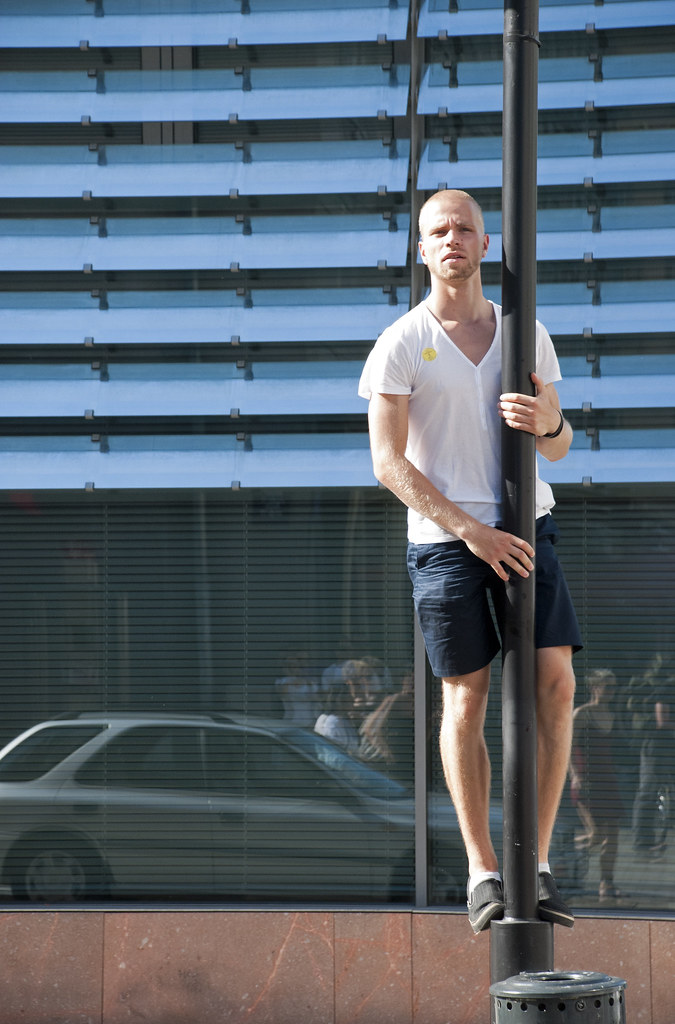
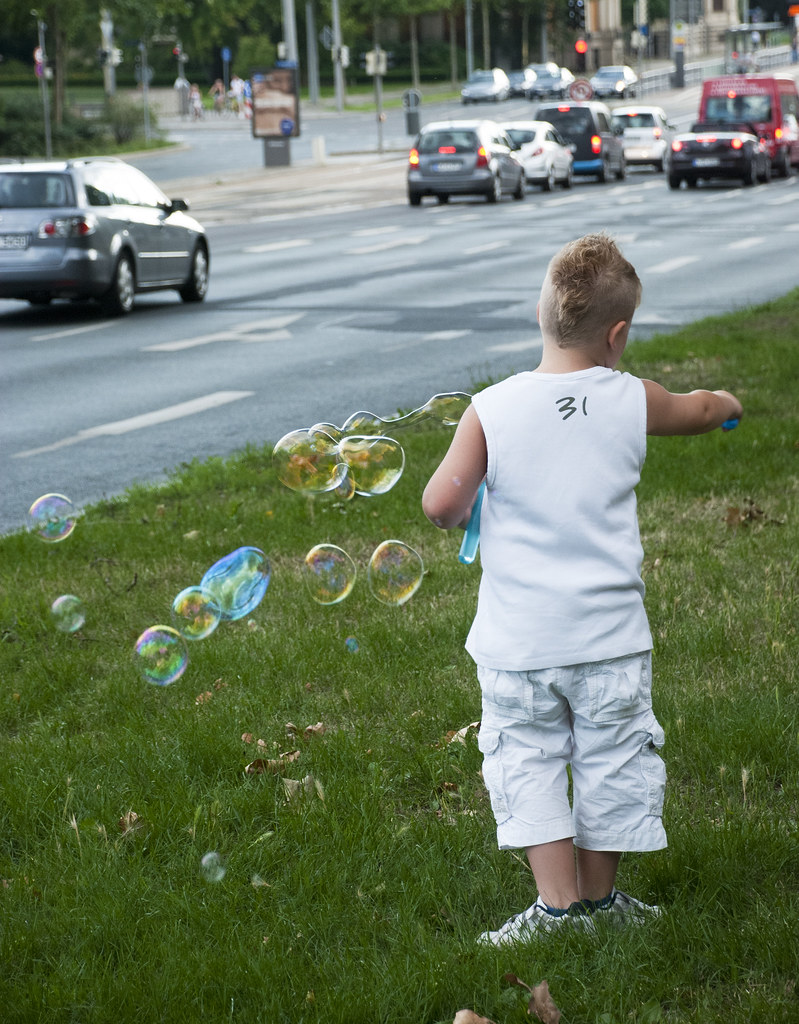
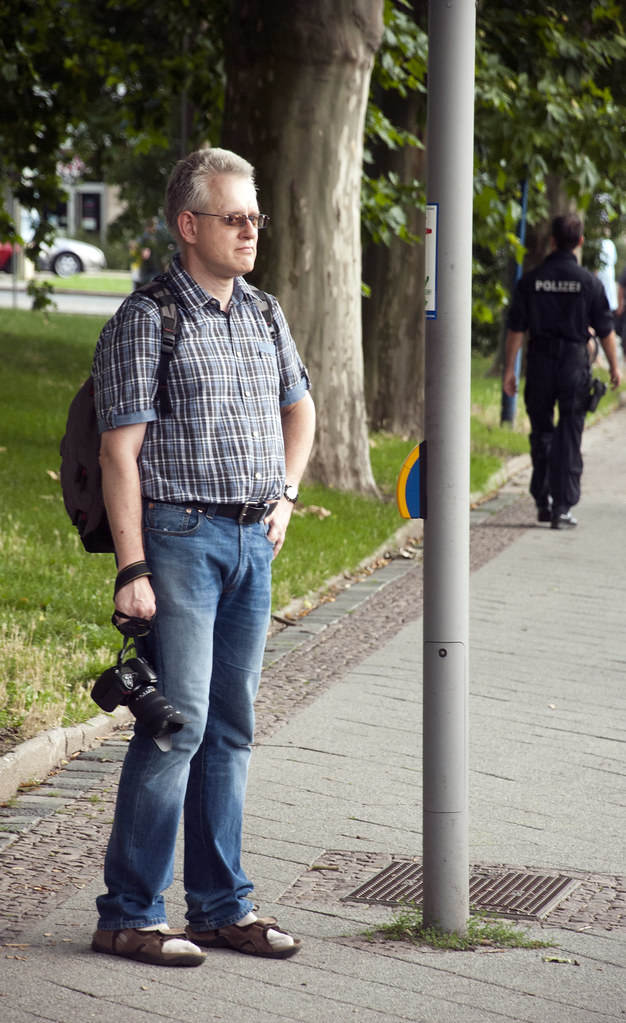



Zettelkasten:
fotoalbum
Freitag, 8. Juli 2011
Buchbesprechung: Jovan Nikolić "Seelenfänger".
Nach metafiktionalen Bücherträumen (Goran Petrovićs "Die Villa am Rande der Zeit" und Zoran Zivkovićs "Der unmögliche Roman") und niedlich-naiver Weltbetrachtung (Dragan Aleksićs "Vorvorgestern" und "Im Ministerium für Mamas Angelegenheiten" von Bora Ćosić) mal was Neues: Unverhohlen vorgetragene Misanthropie und lähmende Angst. In vier Abschnitten zeichnet Jovan Nikolić ein Bild von der menschlichen Existenz voll Krankheit, Schmerz - der sich hier dankenswerterweise auch einmal physisch manifestieren darf - und Unsicherheit, das nicht unbedingt Freude auf den nächsten Tag macht. Dafür aber umso mehr auf die nächste Seite. Vor allem im ersten Abschnitt "Hypochondrie" (auch die anderen sind nach Geisteskrankheiten benannt: "Apathie", "Somnambulie" und "Familie") überschlägt sich Nikolić beinahe mit Beschreibungen von innerlich faulen Körpern, fieberndem Wahn und überempfindlichen Organen am Rande des Versagens.
Dass diese Betrachtung des Verfalls und der Qual vor allem eine Selbstbetrachtung ist, daran lässt Nikolić keinen Zweifel. Dafür aber - dank leicht erhobener Braue über dem manisch zwinkernden Auge - daran, dass das alles so ernst gemeint ist, wie es klingt. "Hoffnungslos, aber nicht ernst. Eine Lektion in Galgenhumor", so dann auch der Einband, den das vielleicht abgründigste Titelbild dieses Jahres schmückt. Und selbst wenn es doch um den Körper so schlimm steht, wie in den Zeilen beschrieben, kommt der Autor nicht umhin, dem noch etwas Gutes abzugewinnen: Lieber Hypochondrie anstatt echter geistiger Leere, lieber ein alle Sinne schärfendes Fieber, lieber ein von der Fäule ergriffener Körper als ein gesättigter, der auch den Geist zufrieden und träge macht. Ekel als Herausforderung.
weiter...
Dass diese Betrachtung des Verfalls und der Qual vor allem eine Selbstbetrachtung ist, daran lässt Nikolić keinen Zweifel. Dafür aber - dank leicht erhobener Braue über dem manisch zwinkernden Auge - daran, dass das alles so ernst gemeint ist, wie es klingt. "Hoffnungslos, aber nicht ernst. Eine Lektion in Galgenhumor", so dann auch der Einband, den das vielleicht abgründigste Titelbild dieses Jahres schmückt. Und selbst wenn es doch um den Körper so schlimm steht, wie in den Zeilen beschrieben, kommt der Autor nicht umhin, dem noch etwas Gutes abzugewinnen: Lieber Hypochondrie anstatt echter geistiger Leere, lieber ein alle Sinne schärfendes Fieber, lieber ein von der Fäule ergriffener Körper als ein gesättigter, der auch den Geist zufrieden und träge macht. Ekel als Herausforderung.
weiter...
Zettelkasten:
lesezeichen
Montag, 4. Juli 2011
A month of movies: June.
It's been a slow movies month for me, if only because of the fact that for a large part of it I was extremely busy and for another one and a half weeks on vacation. I did finally catch up on everybody else though and saw two recent DVD releases that have made it into the IMDB Top 250 - and while I enjoyed both (if for entirely different reasons and to a different degree), I cannot quite agree with their rank. But go ahead and read it all:
The short -
Go and see: /
Well worth watching: How To Train Your Dragon (DVD).
Also deserving a chance: The Social Network (DVD), 9 Leben & Joschka Und Herr Fischer.
The long -
The short -
Go and see: /
Well worth watching: How To Train Your Dragon (DVD).
Also deserving a chance: The Social Network (DVD), 9 Leben & Joschka Und Herr Fischer.
The long -
Zettelkasten:
kinoticket
Donnerstag, 30. Juni 2011
Beograd, te volim.
Demnächst auch mal wieder Fotos, aber erstmal: Urlaub an der Donau.
Zettelkasten:
note to self
Donnerstag, 16. Juni 2011
Mittwoch, 15. Juni 2011
Montag, 13. Juni 2011
Besetzungswechsel.
"'Das Spiel ist aus!' riefen in der Schlußszene die endlich siegreichen Gegenspieler den entlarvten bösen Machthabern zu, verstellten ihnen den Weg zur Flucht oder zu den Waffen, nahmen sie fest und führten sie, ohne sie noch eines Blickes zu würdigen, in die Kulisse ab, während der Vorhang fiel. Als er dann aber zum Applaus wieder hochging, kamen die besiegten Machthaber schon Hand in Hand mit den neuen Siegern zurück, und alle verneigten sich artig vor dem Publikum, das ihnen zurief und wie von allen guten Geistern verlassen Beifall klatschte."
(Erich Fried, in: "Mein Heldenzeitalter", S. 176, "Die Tragödie")
"Wer, um frei zu sein, die Macht stürzt, übernimmt das Gegenteil der Freiheit, die Macht."
(Max Frisch, in: "Graf Öderland", S. 136)
"Alle Rechtdenkenden sind meistens nur eine einzige Person. Heute bin ich es und die Meinen, morgen bist du es und die Deinen. - Man wird dazu ernannt, oder besser, man ernennt sich dazu."
(August Strindberg, in: "Ein Traumspiel", S. 94)
(Erich Fried, in: "Mein Heldenzeitalter", S. 176, "Die Tragödie")
"Wer, um frei zu sein, die Macht stürzt, übernimmt das Gegenteil der Freiheit, die Macht."
(Max Frisch, in: "Graf Öderland", S. 136)
"Alle Rechtdenkenden sind meistens nur eine einzige Person. Heute bin ich es und die Meinen, morgen bist du es und die Deinen. - Man wird dazu ernannt, oder besser, man ernennt sich dazu."
(August Strindberg, in: "Ein Traumspiel", S. 94)
Zettelkasten:
notizblock
Mittwoch, 8. Juni 2011
It's just people having a good time.
Keine Angst, ihr seid nicht bei Tumbler gelandet. Trotz Audrey. Bei mir gibt's zu den Bildern nämlich auch Inhalt, der nicht selbst dazu gedacht werden muss: Filme raten, virtuelle Kekse gewinnen! (Und eines Tages gegen selbstgebackene Chocolate Chip Cookies eintauschen können. Versprochen.)
Zettelkasten:
kinoticket
Dienstag, 31. Mai 2011
A month of movies: May.
In order to deal with what I previous month coined "Leipzig's critical lack of movies presented in original language", I decided to change the rules of the game and start presenting mini-reviews of recent DVD releases as well. This will also allow me to get to some of the... shall we say more popular titles, as witnessed in this installment, in which I say a few words about two movies I've been wanting to see for quite a while and fewer words about two I didn't really feel like watching. You may guess which is which. On to the show:
The short -
Go and see: /
Well worth watching: Passione & Im Himmel, Unter der Erde (In Heaven Underground).
Also deserving a chance: Lebanon (DVD).
Average: Un Homme Qui Crie (A Screaming Man), Utopia Ltd., Buried (DVD).
For lovers of German comedy: Polnische Ostern, Vincent Will Meer (Vincent Wants To Sea).
For the Action Man® in you: Robin Hood (DVD), The A-Team (DVD).
For documentary enthusiasts: Kleinstheim.
Forget about: V Subbotu (Innocent Saturday).
The long -
The short -
Go and see: /
Well worth watching: Passione & Im Himmel, Unter der Erde (In Heaven Underground).
Also deserving a chance: Lebanon (DVD).
Average: Un Homme Qui Crie (A Screaming Man), Utopia Ltd., Buried (DVD).
For lovers of German comedy: Polnische Ostern, Vincent Will Meer (Vincent Wants To Sea).
For the Action Man® in you: Robin Hood (DVD), The A-Team (DVD).
For documentary enthusiasts: Kleinstheim.
Forget about: V Subbotu (Innocent Saturday).
The long -
Zettelkasten:
kinoticket
Dienstag, 24. Mai 2011
We live together in a photograph of time.
Note to self: Kein Antony auf dem Nachhauseweg in der Morgendämmerung.
Zettelkasten:
note to self
Samstag, 21. Mai 2011
Buchbesprechung: Bora Ćosić "Im Ministerium für Mamas Angelegenheiten".
„Mamas Angelegenheiten“ machen da weiter, wo Bora Ćosić in seinem auch in Deutschland bekannten Klassiker „Die Rolle meiner Familie in der Weltrevolution“ aufgehört hat: Mit der Erzählung des Alltags einer jugoslawischen Familie in Belgrad vor, während und nach dem Zweiten Weltkrieg. Deren Leben zwischen Normalität und dem Wahnsinn dieser Zeit beschreibt Ćosić wieder aus der Sicht des Sprösslings der Sippe, der die Absonderlichkeiten seiner Verwandtschaft so selbstverständlich hinnimmt, dass sich bald auch Leser und Leserin mit deren Absurdität abfinden. Alle kommen sie zu Wort: Die Tanten ungefragt zu wirklich jedem Thema, der Schürzen jagende Onkel am liebsten über Frauen, Opa weiß es in jedem Fall besser und die vergeblich um Fassung und Anstand ringende Mama weist den schon wieder besoffenen Papa zurecht. Zwischendurch erzählen die Nachbarn die neuesten Gerüchte übereinander.
Von allen Seiten kommentiert wird dabei auch die finstere Realität der 40er Jahre, als erst Deutsche den Ton angeben und Menschen jagen und dann unter umgedrehten Vorzeichen die russischen Befreier Kollaborateure und jene, die sie dafür halten – und das sind viele –, hinrichten. Umgekommen wird leicht im umkämpften und neu gegründetem Jugoslawien, und wen es nicht gleich dahinrafft, der/die wird von Hunger und Kälte geplagt. Umstürze werden hingenommen, in der Schule werden neue Parolen gelehrt, Opa bleibt skeptisch und die Tanten erfreuen sich an der wechselnden Mode. Ganz nebenbei werden in „Mamas Angelegenheiten“ so Triviales und Weltgeschichte vermengt. Das alles passiert aber in einem so liebenswert absurden und vor allem absurd liebenswerten Tonfall, dass der Sprung von der Farce ins Groteske vonstattengeht ohne Narben zu hinterlassen. Mama weiß, „das Leben bleibt bitter und unheilbar!“, also: Weitermachen und sich nicht allzu sehr ins gefährliche Geschehen einmischen.
weiter...
Von allen Seiten kommentiert wird dabei auch die finstere Realität der 40er Jahre, als erst Deutsche den Ton angeben und Menschen jagen und dann unter umgedrehten Vorzeichen die russischen Befreier Kollaborateure und jene, die sie dafür halten – und das sind viele –, hinrichten. Umgekommen wird leicht im umkämpften und neu gegründetem Jugoslawien, und wen es nicht gleich dahinrafft, der/die wird von Hunger und Kälte geplagt. Umstürze werden hingenommen, in der Schule werden neue Parolen gelehrt, Opa bleibt skeptisch und die Tanten erfreuen sich an der wechselnden Mode. Ganz nebenbei werden in „Mamas Angelegenheiten“ so Triviales und Weltgeschichte vermengt. Das alles passiert aber in einem so liebenswert absurden und vor allem absurd liebenswerten Tonfall, dass der Sprung von der Farce ins Groteske vonstattengeht ohne Narben zu hinterlassen. Mama weiß, „das Leben bleibt bitter und unheilbar!“, also: Weitermachen und sich nicht allzu sehr ins gefährliche Geschehen einmischen.
weiter...
Zettelkasten:
lesezeichen
Mittwoch, 18. Mai 2011
Montag, 16. Mai 2011
Freitag, 13. Mai 2011
Eurovision '11.
It's that time of the year again. Cue the best of jingoism, chauvinism, racism and glitter. Someone's country is probably better than somebody else's country and all for the wrong reasons - unless you can make up some new ones, which should include made-in-Moldova-CGI (it's starting!) and plastic surgery. If you ever cared to know about Judith Butler's secret passion for Maltese breasts, do read on. If you ever cared for music, go and watch a recording of Eurovision 2008 or 2009.
Albania: A strawberry ice-cream haircut, America '01 symbology, cloning and an innovative way of zooming into Google Earth. What more could you ask for? Well, plastic surgery actually would do nicely, for starters. Failed to qualify for the final.
Armenia: Boom Boom Chaka Chaka, your love is like a whacka. Well, thanks Emmy, I appreciate the sentiment, but there have been quite enough Eastern European mafia types driving their overpowered sport cars down Unter den Linden while listening to crap techno music before. Failed to qualify for the final.
Austria: Austria is back and may as well go away for a few years again.
Azerbaijan: A duet ballad. If you've forgotten to care, the male singer's face will remind you that Azerbaijan is not exactly a Central European country. The male singer's voice, however, will remind you that you really ought to not keep forgetting to put that nutria trap out at night.
Belarus: Our favourite remaining European dictatorship surprises us with a propaganda anthem originally titled "I love Belarus". I love Belarus cock, feel it in my hand. And I wanna see your bum shake, Aleksandar Lukashenko! Failed to qualify for the final, which back in Minsk qualifies her for the firing squad.
Belgium: Credit where credit is due: At least they're trying to be somewhat different. It still doesn't appeal to me, but I can totally see this ported into South Park. Failed to qualify for the final.
Bosnia & Herzegovina: Yodel-ohoho! Yodel-ahaha! Whoo-ooo-oah-ohoho! Inbetween looking like a harmless member of the British House of Lords, ready to join Prince William in a spree of fox hunting, Dino occasionally glares at the camera, showing his true war criminal face.
Bulgaria: Codename: "Haircut". It almost would have been "Make-Up". Awkward pointing at the blue stage an added bonus. Failed to qualify for the final.
Croatia: Bimbo alarm in, you guessed it, Croatia. Celebrate! Every single step you take! Stop the world for a moment! Shine like a comet! Nothing can stop you now! Besides the remainders of anything that might be considered a taste in music, women or anything else for that matter perhaps. Failed to qualify for the final.
Cyprus: Previous years have taught us that the people from Cyprus have a knack for corny music videos that seem to be shot with a phone camera. This one looks like a trailer for a Mediterranean horror-themed soap opera. Failed to qualify for the final.
Denmark: Winner of the Prince-Memorial-Haircut-Award. When you're beginning to realize the fact that the singer's hair is not actually burning but merely being aimed at by a massive lighting system, the band's producers reconsider and aim it right at your retina in an effort to shell-shock you into liking this crap.
Estonia: Rihanna has finally gone completely insane and bleached both her face and her music.
Finland: Growing hemp is serious business. As is global warming and all that jazz, but hey, it makes for nice ballads and da, da, da, (Three Gorges) dams.
France: Soundtrack to the latest historical movie with an alternate timeline, Christian conspiracy theories and Russell Crowe in the lead? Initial calculations indicate a strong "Yes".
Georgia: Amy Imbruglia on a drug trip that causes her to violently flail her arms. And the rapping guy from Linkin Park. Both missing out on the fact that Earth's rotation could be interpreted as a symbol of time passing, things changing, trends fading.
Germany: Sending previous year's winners doesn't have much of a history of success in Eurovision, but it might actually work out for Germany's entry due to the title winning the straight guys vote. Everyone else will have fallen asleep by the end of the song though.
Greece: Dark, brotha. If you hadn't hired Ricky Martin to do the chorus, that is. Studded bracelet and basecap vs. erratic hand movements and a haircut so gelled up it develops its own conscience and positively refuses to follow on grounds of labour legislation.
Hungary: The United States of Cast Stone and Feeling Hand, clad in leather. Also: A haircut that scares the beeheevus out of me, smudged eyeshadow and disco balls.
Iceland: Having to rip off Germany's pop corpse Sascha is a sad, sad affair. Go back to ten years ago.
Ireland: Finally, regular fags. Attempting to carry on the fine tradition of copying Eleanor Jackson's latest haircut the twins fail spectacularly and end up looking like condoms. I have less nice things to say about their music.
Israel: Ding Dong Same Old Song. Dana International is back, and one can only hope she'll lose her physical balance again. Her vocal balance is fragile as it is. Failed to qualify for the final.
Italy: Honestly, this is okay. You'll be fine. Just stop smiling like that, please.
Latvia: Winner of the annual RHYMECORE-Award. "Kill me with killa kiss, kill me with tempting lips. Stare at me with candy eyes, love me luscious thighs, angel in disguise." Somewhere in the last third of the song, a hipster dwarf unexpectedly attempts to rap while the singer with an emo-haircut expectedly breaks out in "Ohooohhhs" and "Noooohhnoooonooos". Failed to qualify for the final.
Lithuania: A traditional Eurovision entry, to put those to sleep who just have been violently awoken by all the 90's Eurovision entries. Does resemble a hog more often than looking like a Ad&D troll villain.
Macedonia: More hair that will not budge, more guitars that serve as props only and more of the same. The Former Yugoslavian Republic continues to fail to inspire. Failed to qualify for the final.
Malta: Care for Judith Butler and breasts a lot? Maybe I promised too much. Instead we have Warhol, breakdancing, Lichtenstein, a drag queen and "Don't try to judge me, you don't know how I feel" lyrics. They're not even ashamed. Failed to qualify for the final.
Moldova: Franz Ferdinand have relocated to Chişinău. Ben is not fazed.
Netherlands: A dwarf with a guitar, greasy hair, Bono sunglasses and the least interesting song imaginable. Way to not surprise me, Dutchies. Failed to qualify for the final.
Norway: Stella, Stellaaaaaaaaaa! Where did you get than tan in Norway? Eurodance meets supposedly African beats. The Football World Cup was last year, doofus. Failed to qualify for the final.
Poland: Zoom, pan, shake hair. Wave hand. Will fail horribly but following the show net a contract with a shampoo manufacturer. Failed to qualify for the final.
Portugal: The Village People have migrated to Portugal. Telling their new home country's history in six costumes, they dress up as a military dictator, a bureaucratic dictator, a hippie and three odd fags. Failed to qualify for the final.
Romania: Air keyboard! Animated picture frames! Drumming in a lift cabin! Air drumming! These Romanians sure are zany guys. The video also features a song that sadly will not stop by itself.
Russia: I CANNOT FOR THE LOVE OF GOD PRONOUNCE ENGLISH WORDS. I also look funny seen through a fisheye lens. Lou Pearlman, help me!
San Marino: Excuse me, but you've got something in your hair there. When the singer is wearing her hat and Colonel Gaddafi goggles instead, this seems like the official chemotherapy acceptance song. Failed to qualify for the final.
Serbia: Careful, Serbia, for you're going where countless countries have failed in previous years. At this point not even massive amounts of plastic around the stage and in your singer's face will save you.
Slovakia: Albania's evil nationalistic twin. I get it: Slovakia excels at both sports and catastrophes. Failed to qualify for the final.
Slovenia: Clearly too heterosexual for Eurovision, this song fails even the basic requirements for entertainment. It also evokes a constant feeling of "When have I heard and seen this before?". Slovenia must be one little bored conservative country.
Spain: SMILE BROADLY. DANCE. ARTICULATE CLEARLY. SUCK UP TO ALL OTHER NATIONS. LOOK HAPPY. REPEAT PROCEDURE. SMILE BROADLY. DANCE. ARTICULATE CLEARLY. SUCK UP TO ALL OTHER NATIONS. LOOK HAPPY. REPEAT PROCEDURE. SMILE BROADLY. DANCE. ARTICULATE CLEARLY. SUCK UP TO ALL OTHER NATIONS. LOOK HAPPY. REPEAT PROCEDURE. SMILE BROADLY. DANCE. ARTICULATE CLEARLY. SUCK UP TO ALL OTHER NATIONS. LOOK HAPPY. REPEAT PROCEDURE. SMILE BROADLY. DANCE. ARTICULATE CLEARLY. SUCK UP TO ALL OTHER NATIONS. LOOK HAPPY. REPEAT PROCEDURE. SMILE BROADLY. DANCE. ARTICULATE CLEARLY. SUCK UP TO ALL OTHER NATIONS. LOOK HAPPY. REPEAT PROCEDURE. SMILE BROADLY. DANCE. ARTICULATE CLEARLY. SUCK UP TO ALL OTHER NATIONS. LOOK HAP101111011110111010111... "Boss? Boss, something fucked up with our annual robot!".
Sweden: I will be a poplar. Wins male gay vote for being fondled by his oversexed background dancers even on stage. Watch 2:24 for spesszhul effacts and the Star Trek Original Series red alert klaxon.
Switzerland: Dreamy look? Check. Extended cheekbones? Check. Flashbacks? Check. Nananananana? Check. This year's summer blockbuster romantic comedy soundtrack that will make you want to abort puppies.
Turkey: Reamonn have invested into a keyboard and this year are living it up for Turkey. Keyboard cat could have done better and hopefully for all of us, will do one day. Failed to qualify for the final.
Ukraine: Plastic plonde puppet parades past people in a circus. Creepy circus character certainly approves with a leer.
United Kingdom: A fella that will start a fight with the bouncer at the club tonight, a high-pitched yay-sayer who tonight will bring home sushi to his boyfriend, a village idiot that will defend the Palestinians' right to bomb the hell out of Israel tonight at the debate club and a nigger who tonight will spend dreaming about becoming as awesome as Seal. What could possibly go wrong this time, dear Britannia?
Amusing videos: Albania.
Enjoyable songs: /
Endurable songs: Finland, Italy.
Potential winners: Ireland, United Kingdom?
Albania: A strawberry ice-cream haircut, America '01 symbology, cloning and an innovative way of zooming into Google Earth. What more could you ask for? Well, plastic surgery actually would do nicely, for starters. Failed to qualify for the final.
Armenia: Boom Boom Chaka Chaka, your love is like a whacka. Well, thanks Emmy, I appreciate the sentiment, but there have been quite enough Eastern European mafia types driving their overpowered sport cars down Unter den Linden while listening to crap techno music before. Failed to qualify for the final.
Austria: Austria is back and may as well go away for a few years again.
Azerbaijan: A duet ballad. If you've forgotten to care, the male singer's face will remind you that Azerbaijan is not exactly a Central European country. The male singer's voice, however, will remind you that you really ought to not keep forgetting to put that nutria trap out at night.
Belarus: Our favourite remaining European dictatorship surprises us with a propaganda anthem originally titled "I love Belarus". I love Belarus cock, feel it in my hand. And I wanna see your bum shake, Aleksandar Lukashenko! Failed to qualify for the final, which back in Minsk qualifies her for the firing squad.
Belgium: Credit where credit is due: At least they're trying to be somewhat different. It still doesn't appeal to me, but I can totally see this ported into South Park. Failed to qualify for the final.
Bosnia & Herzegovina: Yodel-ohoho! Yodel-ahaha! Whoo-ooo-oah-ohoho! Inbetween looking like a harmless member of the British House of Lords, ready to join Prince William in a spree of fox hunting, Dino occasionally glares at the camera, showing his true war criminal face.
Bulgaria: Codename: "Haircut". It almost would have been "Make-Up". Awkward pointing at the blue stage an added bonus. Failed to qualify for the final.
Croatia: Bimbo alarm in, you guessed it, Croatia. Celebrate! Every single step you take! Stop the world for a moment! Shine like a comet! Nothing can stop you now! Besides the remainders of anything that might be considered a taste in music, women or anything else for that matter perhaps. Failed to qualify for the final.
Cyprus: Previous years have taught us that the people from Cyprus have a knack for corny music videos that seem to be shot with a phone camera. This one looks like a trailer for a Mediterranean horror-themed soap opera. Failed to qualify for the final.
Denmark: Winner of the Prince-Memorial-Haircut-Award. When you're beginning to realize the fact that the singer's hair is not actually burning but merely being aimed at by a massive lighting system, the band's producers reconsider and aim it right at your retina in an effort to shell-shock you into liking this crap.
Estonia: Rihanna has finally gone completely insane and bleached both her face and her music.
Finland: Growing hemp is serious business. As is global warming and all that jazz, but hey, it makes for nice ballads and da, da, da, (Three Gorges) dams.
France: Soundtrack to the latest historical movie with an alternate timeline, Christian conspiracy theories and Russell Crowe in the lead? Initial calculations indicate a strong "Yes".
Georgia: Amy Imbruglia on a drug trip that causes her to violently flail her arms. And the rapping guy from Linkin Park. Both missing out on the fact that Earth's rotation could be interpreted as a symbol of time passing, things changing, trends fading.
Germany: Sending previous year's winners doesn't have much of a history of success in Eurovision, but it might actually work out for Germany's entry due to the title winning the straight guys vote. Everyone else will have fallen asleep by the end of the song though.
Greece: Dark, brotha. If you hadn't hired Ricky Martin to do the chorus, that is. Studded bracelet and basecap vs. erratic hand movements and a haircut so gelled up it develops its own conscience and positively refuses to follow on grounds of labour legislation.
Hungary: The United States of Cast Stone and Feeling Hand, clad in leather. Also: A haircut that scares the beeheevus out of me, smudged eyeshadow and disco balls.
Iceland: Having to rip off Germany's pop corpse Sascha is a sad, sad affair. Go back to ten years ago.
Ireland: Finally, regular fags. Attempting to carry on the fine tradition of copying Eleanor Jackson's latest haircut the twins fail spectacularly and end up looking like condoms. I have less nice things to say about their music.
Israel: Ding Dong Same Old Song. Dana International is back, and one can only hope she'll lose her physical balance again. Her vocal balance is fragile as it is. Failed to qualify for the final.
Italy: Honestly, this is okay. You'll be fine. Just stop smiling like that, please.
Latvia: Winner of the annual RHYMECORE-Award. "Kill me with killa kiss, kill me with tempting lips. Stare at me with candy eyes, love me luscious thighs, angel in disguise." Somewhere in the last third of the song, a hipster dwarf unexpectedly attempts to rap while the singer with an emo-haircut expectedly breaks out in "Ohooohhhs" and "Noooohhnoooonooos". Failed to qualify for the final.
Lithuania: A traditional Eurovision entry, to put those to sleep who just have been violently awoken by all the 90's Eurovision entries. Does resemble a hog more often than looking like a Ad&D troll villain.
Macedonia: More hair that will not budge, more guitars that serve as props only and more of the same. The Former Yugoslavian Republic continues to fail to inspire. Failed to qualify for the final.
Malta: Care for Judith Butler and breasts a lot? Maybe I promised too much. Instead we have Warhol, breakdancing, Lichtenstein, a drag queen and "Don't try to judge me, you don't know how I feel" lyrics. They're not even ashamed. Failed to qualify for the final.
Moldova: Franz Ferdinand have relocated to Chişinău. Ben is not fazed.
Netherlands: A dwarf with a guitar, greasy hair, Bono sunglasses and the least interesting song imaginable. Way to not surprise me, Dutchies. Failed to qualify for the final.
Norway: Stella, Stellaaaaaaaaaa! Where did you get than tan in Norway? Eurodance meets supposedly African beats. The Football World Cup was last year, doofus. Failed to qualify for the final.
Poland: Zoom, pan, shake hair. Wave hand. Will fail horribly but following the show net a contract with a shampoo manufacturer. Failed to qualify for the final.
Portugal: The Village People have migrated to Portugal. Telling their new home country's history in six costumes, they dress up as a military dictator, a bureaucratic dictator, a hippie and three odd fags. Failed to qualify for the final.
Romania: Air keyboard! Animated picture frames! Drumming in a lift cabin! Air drumming! These Romanians sure are zany guys. The video also features a song that sadly will not stop by itself.
Russia: I CANNOT FOR THE LOVE OF GOD PRONOUNCE ENGLISH WORDS. I also look funny seen through a fisheye lens. Lou Pearlman, help me!
San Marino: Excuse me, but you've got something in your hair there. When the singer is wearing her hat and Colonel Gaddafi goggles instead, this seems like the official chemotherapy acceptance song. Failed to qualify for the final.
Serbia: Careful, Serbia, for you're going where countless countries have failed in previous years. At this point not even massive amounts of plastic around the stage and in your singer's face will save you.
Slovakia: Albania's evil nationalistic twin. I get it: Slovakia excels at both sports and catastrophes. Failed to qualify for the final.
Slovenia: Clearly too heterosexual for Eurovision, this song fails even the basic requirements for entertainment. It also evokes a constant feeling of "When have I heard and seen this before?". Slovenia must be one little bored conservative country.
Spain: SMILE BROADLY. DANCE. ARTICULATE CLEARLY. SUCK UP TO ALL OTHER NATIONS. LOOK HAPPY. REPEAT PROCEDURE. SMILE BROADLY. DANCE. ARTICULATE CLEARLY. SUCK UP TO ALL OTHER NATIONS. LOOK HAPPY. REPEAT PROCEDURE. SMILE BROADLY. DANCE. ARTICULATE CLEARLY. SUCK UP TO ALL OTHER NATIONS. LOOK HAPPY. REPEAT PROCEDURE. SMILE BROADLY. DANCE. ARTICULATE CLEARLY. SUCK UP TO ALL OTHER NATIONS. LOOK HAPPY. REPEAT PROCEDURE. SMILE BROADLY. DANCE. ARTICULATE CLEARLY. SUCK UP TO ALL OTHER NATIONS. LOOK HAPPY. REPEAT PROCEDURE. SMILE BROADLY. DANCE. ARTICULATE CLEARLY. SUCK UP TO ALL OTHER NATIONS. LOOK HAPPY. REPEAT PROCEDURE. SMILE BROADLY. DANCE. ARTICULATE CLEARLY. SUCK UP TO ALL OTHER NATIONS. LOOK HAP101111011110111010111... "Boss? Boss, something fucked up with our annual robot!".
Sweden: I will be a poplar. Wins male gay vote for being fondled by his oversexed background dancers even on stage. Watch 2:24 for spesszhul effacts and the Star Trek Original Series red alert klaxon.
Switzerland: Dreamy look? Check. Extended cheekbones? Check. Flashbacks? Check. Nananananana? Check. This year's summer blockbuster romantic comedy soundtrack that will make you want to abort puppies.
Turkey: Reamonn have invested into a keyboard and this year are living it up for Turkey. Keyboard cat could have done better and hopefully for all of us, will do one day. Failed to qualify for the final.
Ukraine: Plastic plonde puppet parades past people in a circus. Creepy circus character certainly approves with a leer.
United Kingdom: A fella that will start a fight with the bouncer at the club tonight, a high-pitched yay-sayer who tonight will bring home sushi to his boyfriend, a village idiot that will defend the Palestinians' right to bomb the hell out of Israel tonight at the debate club and a nigger who tonight will spend dreaming about becoming as awesome as Seal. What could possibly go wrong this time, dear Britannia?
Amusing videos: Albania.
Enjoyable songs: /
Endurable songs: Finland, Italy.
Potential winners: Ireland, United Kingdom?
Zettelkasten:
spickzettel
Montag, 9. Mai 2011
Kommst du raus aus dem Alltag?
"Die Welt, die ihm gegeben war, mochte er nicht. Darum verließ er Welt, Menschen und sichtbare Gegenstände und begab sich in die warmen, sonnigen Länder der Antike."
(Andrzej Szczypiorski, in: "Die schöne Frau Seidenman", S. 194)
"A true feeler always brings half the entertainment along with him. His own ideas are only call'd forth by what he reads, and the vibrations within, so entirely correspond with those excited, 'tis like reading himself and not the book."
(Laurence Sterne, in einem Brief)
"No wonder that the Mythology, and Arabian Nights, and Shakespeare, and Scott's novels entertain us,--we are poets and fablers and dramatists and novelists ourselves. We are continually acting a part in a more interesting drama than any written."
(Henry David Thoreau, in: "A week on the Concord and Merrimack Rivers", S. 75)
"People say that life is the thing, but I prefer reading."
(Logan Pearsall Smith)
(Andrzej Szczypiorski, in: "Die schöne Frau Seidenman", S. 194)
"A true feeler always brings half the entertainment along with him. His own ideas are only call'd forth by what he reads, and the vibrations within, so entirely correspond with those excited, 'tis like reading himself and not the book."
(Laurence Sterne, in einem Brief)
"No wonder that the Mythology, and Arabian Nights, and Shakespeare, and Scott's novels entertain us,--we are poets and fablers and dramatists and novelists ourselves. We are continually acting a part in a more interesting drama than any written."
(Henry David Thoreau, in: "A week on the Concord and Merrimack Rivers", S. 75)
"People say that life is the thing, but I prefer reading."
(Logan Pearsall Smith)
Zettelkasten:
notizblock
Sonntag, 1. Mai 2011
A month of movies: April.
Leipzig is showing a critical lack of movies presented in original language. Why anyone would, why I used to settle for dubbed films is beyond at me this point. It's painful to watch and listen to, prone to awkward translation errors and removes a sizable part from acting performances. I'm not sure why so few movie theaters in Leipzig show original language films, as they're usually just as popular especially at small locations, and I'd imagine there being a big enough foreign crowd as well in this town. Here's what remains:
The short -
Go and see: /
Well worth watching: Winter's Bone & Francesco und der Papst.
Also deserving a chance: Womb & White Box.
For fans of Asian cinema only: Hanyo (The Housemaid).
The long -
The short -
Go and see: /
Well worth watching: Winter's Bone & Francesco und der Papst.
Also deserving a chance: Womb & White Box.
For fans of Asian cinema only: Hanyo (The Housemaid).
The long -
Zettelkasten:
kinoticket
Dienstag, 26. April 2011
Buchbesprechung: Zoran Zivković "Der unmögliche Roman".
Beim "Unmöglichen Roman" handelt es sich genau genommen um gar keinen – sondern um eine Sammlung von fünf, zwischen 1997 und 2003 entstandenen und zuvor noch nicht auf Deutsch veröffentlichten, Erzählreihen. In jeder einzelnen untersucht Zoran Živković unter dem Deckmantel der Phantastik die Beziehung zwischen Verfasser, Text und der von ihm darin erschaffenen Welt. Das geschieht von Reihe zu Reihe – hier als Bücher bezeichnet – auf inhaltlich unterschiedliche, konzeptuell und sprachlich aber stark vergleichbare Art und Weise. Die Grenzen zwischen Unmöglichem, Erdachtem und Metafiktion verschwimmen dabei spätestens in einer jedes einzelne Buch abschließenden Erzählung, die das verbindende Thema der vorangegangen aufnimmt und ihm eine Pointe hinzufügt.
Das ist nicht besonders revolutionär, weiß aber zumindest anfangs noch zu interessieren. Im ersten Buch ("Zeitgeschenke") tritt der Autor als Vergangenheit und Zukunft verändernder Schicksalsmacher im Text selbst in Erscheinung. Er gibt den Charakteren – seinen Charakteren – die Chance, durch das Eingreifen in einem ihr Leben definierenden Moment eben jenes umzuschreiben. Erhalten bleibt ihnen jedoch das Wissen um die ursprüngliche Realität und die damit einhergehende moralische und geistige Belastung. Ist die Alternative in jedem Fall besser? Mit dieser Frage seine Protagonist/-innen allein lassend, versündigt sich der Autor an ihnen – und tritt dafür auf den letzten Seiten selbst Buße an.
Auch die zweite Erzählreihe ("Unmögliche Begegnungen"), in der sich ein Buch gleichen Namens als Thema durch die Einzeltexte zieht, vermag noch zu überraschen. Hier ist der Autor wieder mit gottgleichen Schöpfungsfähigkeiten ausgestattet, weiß dies aber selbst nicht, bis er in der letzten Geschichte von einer seiner Figuren darüber aufgeklärt wird. Auf diese Weise wird ihm auch die Möglichkeit der eigenen Unsterblichkeit durch die Verschriftlichung, die Fiktionalisierung seiner selbst, offenbart. Erweitert wird diese Metaebene noch einmal durch das vierte Buch ("Die Bibliothek"), in dessen Geschichten nicht nur die gesamte – jemals geschriebene, noch zu schreibende und potentielle – Literatur ihren Weg in virtuelle und vorgestellte Regale findet, sondern auch die Biographien aller menschlichen Leben. Diese sind bis ins kleinste Detail dokumentiert, gebunden und archiviert und von jedem Menschen einsehbar. Auch hier dreht sich Živković also wieder um das Erkennen des Selbst im Schreiben, und um das Leben als Akt des Schreibens der eigenen Geschichte.
weiter...
Das ist nicht besonders revolutionär, weiß aber zumindest anfangs noch zu interessieren. Im ersten Buch ("Zeitgeschenke") tritt der Autor als Vergangenheit und Zukunft verändernder Schicksalsmacher im Text selbst in Erscheinung. Er gibt den Charakteren – seinen Charakteren – die Chance, durch das Eingreifen in einem ihr Leben definierenden Moment eben jenes umzuschreiben. Erhalten bleibt ihnen jedoch das Wissen um die ursprüngliche Realität und die damit einhergehende moralische und geistige Belastung. Ist die Alternative in jedem Fall besser? Mit dieser Frage seine Protagonist/-innen allein lassend, versündigt sich der Autor an ihnen – und tritt dafür auf den letzten Seiten selbst Buße an.
Auch die zweite Erzählreihe ("Unmögliche Begegnungen"), in der sich ein Buch gleichen Namens als Thema durch die Einzeltexte zieht, vermag noch zu überraschen. Hier ist der Autor wieder mit gottgleichen Schöpfungsfähigkeiten ausgestattet, weiß dies aber selbst nicht, bis er in der letzten Geschichte von einer seiner Figuren darüber aufgeklärt wird. Auf diese Weise wird ihm auch die Möglichkeit der eigenen Unsterblichkeit durch die Verschriftlichung, die Fiktionalisierung seiner selbst, offenbart. Erweitert wird diese Metaebene noch einmal durch das vierte Buch ("Die Bibliothek"), in dessen Geschichten nicht nur die gesamte – jemals geschriebene, noch zu schreibende und potentielle – Literatur ihren Weg in virtuelle und vorgestellte Regale findet, sondern auch die Biographien aller menschlichen Leben. Diese sind bis ins kleinste Detail dokumentiert, gebunden und archiviert und von jedem Menschen einsehbar. Auch hier dreht sich Živković also wieder um das Erkennen des Selbst im Schreiben, und um das Leben als Akt des Schreibens der eigenen Geschichte.
weiter...
Zettelkasten:
lesezeichen
Sonntag, 24. April 2011
Abonnieren
Kommentare (Atom)











